Abstract
Introduction:
The Smart Sustainable City Baghdad (SSCB-App) initiative advances a novel, multi-sectoral framework for urban transformation in fragile and conflict-affected contexts. Conceived as both a technological innovation and a governance instrument, the SSCB-App operationalizes the principles of resilience, sustainability, and inclusivity within a city marked by protracted conflict, infrastructural collapse, and institutional fragmentation. Through the integration of real-time data analytics, interactive dashboards, and scenario-based simulations, the application systematically engages critical urban domains—energy, water, transportation, healthcare, education, security, environment, and governance—while linking them to the global normative architecture of the United Nations Sustainable Development Goals (SDGs).
Methods:
The contribution of this study is threefold. First, it redefines post-conflict urban recovery by embedding resilience thinking into practical decision-support systems that allow policymakers to anticipate risks, test alternative strategies, and align reconstruction efforts with long-term sustainability objectives. Second, it demonstrates how digital technologies, when strategically integrated with governance frameworks, can mediate the tension between immediate stabilization needs and structural reforms aimed at equity and accountability.
Results:
Third, by situating Baghdad as a paradigmatic case, the SSCB-App underscores the epistemic value of fragile cities as laboratories of innovation, where the intersections of conflict, governance, and sustainability illuminate broader theoretical debates in urban studies and development research. Ultimately, the SSCB-App transcends conventional reconstruction by articulating a transferable model that is at once context-specific and globally relevant.
Discussion:
It positions Baghdad not merely as a site of recovery but as a reference point for reimagining the role of smart technologies in enabling resilient, just, and sustainable urban futures. This analytical and model-based study provides an integrated framework for transforming Baghdad into a smart and sustainable city by combining urban planning, renewable energy, environmental protection, and intelligent governance systems.
Graphical Abstract
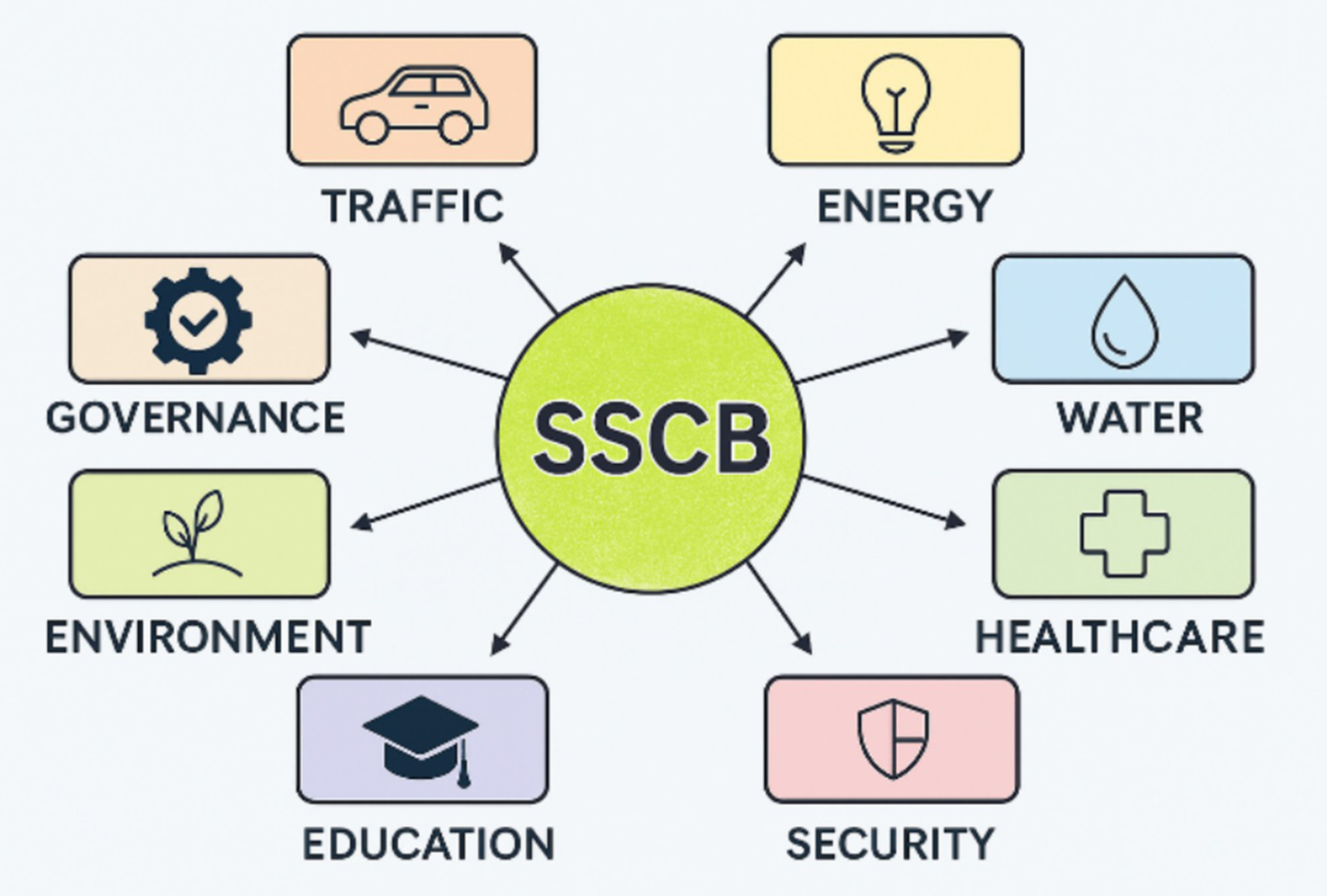
Highlights
-
A holistic framework is proposed for transforming Baghdad into a resilient and sustainable smart city in the post-conflict context.
-
The SSCB-App integrates real-time analytics and decision-support tools across key sectors, including energy, water, transport, and governance.
-
The model is designed to be replicable, offering a scalable approach to urban recovery in other fragile and war-torn cities.
-
The research bridges urban resilience theory with practice through evidence-based policy recommendations.
-
A technology-driven tool is developed to guide sustainable urban planning and reconstruction globally.
Introduction
Baghdad, the capital of Iraq, represents a distinctive urban context shaped by centuries of cultural, economic, and political developments. Once a historic center of knowledge and innovation, the city has undergone profound transformations due to decades of conflict, sanctions, and political instability. These cumulative shocks have left deep imprints on infrastructure, public services, and social cohesion. Today, Baghdad faces the dual challenge of rebuilding its urban environment while accommodating rapid population growth, making it an important case study for exploring smart and sustainable solutions in post-conflict urban settings. These historical and contemporary urban challenges highlight the urgent need for a comprehensive smart and sustainable solution for Baghdad, which this study aims to develop and implement.
The prolonged post-conflict conditions have produced fragmented governance, overburdened infrastructure, and unequal access to essential services such as electricity, water, healthcare, and education. Traditional urban management approaches—largely reactive and sector-specific—have proven inadequate in addressing dynamic shifts in population, resource demand, and environmental stressors. For example, the energy system continues to suffer from frequent blackouts due to insufficient generation and poor distribution, while the water network struggles to meet district-level needs. Chronic traffic congestion, persistent security concerns, and strained healthcare and education services exacerbate social inequities and diminish quality of life.
To respond to these challenges, the concept of Smart Sustainable Cities (SSC) offers a comprehensive framework that integrates information and communication technologies, real-time data analytics, and sustainability principles. SSC frameworks aim to optimize resource efficiency while enhancing resilience, social equity, environmental quality, and citizen participation. Although successful SSC models exist globally, Baghdad’s post-conflict environment presents unique complexities that necessitate context-specific adaptations. Governance fragmentation, security vulnerabilities, and socio-economic inequalities demand innovative, locally tailored solutions.
In this context, the Smart Sustainable City Baghdad Application (SSCB-App) has been developed as a practical, modular, data-driven platform to address Baghdad’s urban challenges. It monitors, analyzes, and optimizes performance across eight critical sectors: energy, water, traffic, healthcare, security, education, environment, and governance. Through interactive dashboards and decision-support tools, city planners can detect inefficiencies, forecast shortages, and implement timely interventions.
The energy module evaluates electricity demand relative to renewable energy potential, while the water module predicts shortages and recommends optimized allocation strategies. Transport modules analyze traffic patterns to improve routing efficiency, and healthcare modules assess patient-to-staff ratios to strengthen service delivery. Governance modules enhance transparency by tracking departmental performance and incorporating citizen feedback. Education modules monitor student-to-teacher ratios and resource allocation, and environmental modules track air quality, recycling rates, and ecological indicators to support sustainability initiatives. Security modules track crime rates and optimize emergency response deployment.
Crucially, the SSCB-App integrates sustainability and resilience principles into everyday urban management. Its intelligent analytics support accurate forecasting of infrastructure needs, optimized resource allocation, and realistic project timelines. Lessons drawn from recent crises underscore the value of adaptability and real-time decision-making in mitigating risks in complex urban environments. By linking advanced technology, sustainability, and participatory governance, the SSCB-App represents a replicable model for transforming Baghdad into a smart and resilient city. Beyond addressing immediate challenges, the platform contributes to long-term objectives, including environmental stewardship, equitable service distribution, and enhanced community engagement. Ultimately, this study demonstrates how innovative applications can bridge the gap between theoretical urban resilience frameworks and operational, evidence-based solutions for post-conflict cities.
Study objectives
The overarching objective of this study is to design and implement an integrated software platform, the Smart Sustainable City Baghdad Application (SSCB-App), to facilitate Baghdad’s transition into a resilient, smart, and sustainable city. The platform is conceived as a holistic decision-support system that continuously monitors, analyzes, and optimizes performance across key urban sectors, addressing the city’s complex challenges in a systematic and data-driven manner.
Energy and water
In the energy sector, SSCB-App evaluates electricity demand in parallel with solar energy production, detecting deficits and surpluses to generate actionable recommendations that improve efficiency and minimize service disruptions. In water management, the platform analyzes district-level supply and demand, identifies shortages, and suggests equitable distribution strategies to ensure both sustainability and fairness.
Urban mobility and healthcare
Urban mobility is enhanced through real-time monitoring of traffic congestion and metro system usage, allowing the application to propose intelligent rerouting and planning strategies that reduce travel times, lower environmental pollution, and improve commuter experiences. In the healthcare sector, SSCB-App evaluates patient-to-staff ratios, highlights areas of high demand, and guides the allocation of medical personnel to ensure timely and equitable service provision.
Public safety, education, environment, and governance
Public safety is strengthened by tracking crime rates and assessing the deployment of security resources, supporting law enforcement and emergency response systems. In the education sector, the platform analyzes student-to-teacher ratios, identifies overcrowded schools, and recommends strategic resource allocation to enhance access and improve educational quality. Environmental monitoring focuses on air quality, recycling rates, and ecological indicators, enabling targeted sustainability initiatives. Finally, SSCB-App supports transparency and administrative efficiency by analyzing departmental service performance, tracking complaint resolution, and enhancing citizen satisfaction.
Collectively, these objectives establish SSCB-App as a comprehensive framework that not only mitigates immediate urban challenges but also fosters long-term resilience, equity, and sustainability in post-conflict Baghdad.
Significance of the study
This study is of critical importance for the future of urban governance and sustainable development in Baghdad, a city navigating the complex aftermath of prolonged conflict while simultaneously facing rapid demographic expansion. By consolidating diverse urban sectors into a single integrated platform, SSCB-App provides municipal authorities with a powerful tool for evidence-based decision-making, enhancing resource allocation, service delivery, and overall quality of life for residents.
Beyond its practical application, the study highlights the transformative role of technology, artificial intelligence, and real-time data analytics in addressing multifaceted urban challenges. The SSCB-App’s modular structure and real-time monitoring capabilities allow city managers to mitigate persistent issues such as electricity shortages, traffic congestion, environmental degradation, and public safety concerns, while fostering participatory governance and enhancing citizen trust in public institutions.
From a scholarly perspective, the study makes a dual contribution: it advances theoretical debates on urban resilience, smart city governance, and sustainability in fragile contexts, and it bridges these frameworks with tangible, operational solutions. By doing so, it demonstrates how post-conflict cities can transition from reactive crisis management to proactive, data-driven, and sustainable urban planning.
Smart sustainable city Baghdad case study (SSCB)
Case Study Description: The SSCB-App case study focuses on two major districts of Baghdad: Al-Karkh and Al-Rusafa, representing diverse urban conditions, population densities, and infrastructure challenges. Data for these districts were collected from official governmental and institutional sources to ensure accuracy and policy relevance. The datasets encompass all SSCB-App modules, including Energy, Water, Traffic, Healthcare, Security, Education, Environment, and Governance. Where real-time or complete data were unavailable, simulated datasets were generated based on historical averages, published research, and internationally recognized benchmarks (e.g., WHO, World Bank, UN-Habitat). Sensitivity validation techniques were applied to test the robustness of the model under varying conditions (Appendix).
Notes:
-
The Appendix summarizes datasets for Al-Karkh and Al-Rusafa districts, reflecting typical urban dynamics in Baghdad.
-
Data reliability and sensitivity validations ensure the SSCB-App outputs are robust, accurate, and transferable.
-
Simulated data are clearly indicated within the main text for transparency.
Baghdad continues to face multi-dimensional humanitarian and service-delivery challenges, particularly in infrastructure, mobility, and essential services (ACAPS, 2020). Recent policy assessments emphasize the need to strengthen governance, transparency, and institutional coordination to support Baghdad’s transition towards a smart and sustainable city (Bayan Center for Planning and Studies, 2024). Reports indicate that improving social stability and citizen protection in Baghdad is closely linked to equitable access to public services and rights-based governance (OHCHR/UNAMI, 2022).
Literature gap and theoretical framework
Research gap
Global scholarship on urban resilience, smart city development, and sustainable governance has demonstrated the transformative potential of data-driven decision-making, integrated infrastructure management, and technology-enabled governance. While these studies provide valuable insights, a critical gap persists in the literature: the application of such frameworks to post-conflict cities in the Middle East. These urban contexts are marked by systemic reconstruction challenges, fragmented governance, socio-economic instability, and infrastructural deficits that are rarely addressed in existing smart city or sustainability research. Previous research often isolates specific sectors such as energy, transportation, or public safety, or else develops theoretical models with limited pathways for operationalization. Integrated and practical solutions—those combining multi-criteria modeling, AI-driven analytics, and interactive decision-support platforms—remain largely absent, particularly in relation to the complex socio-political realities of post-conflict urban environments. Baghdad epitomizes this knowledge gap: decades of conflict, sanctions, and instability have compounded the challenges of rapid urbanization, making traditional approaches to city management both inadequate and unsustainable.
Contribution and theoretical framework
To address these critical gaps, the present study develops the Smart Sustainable City Baghdad Application (SSCB-App). By unifying multiple domains—energy, water, traffic, healthcare, security, education, environmental monitoring, and governance—into a single modular platform, SSCB-App bridges theoretical frameworks of smart city governance, sustainability, and resilience with operational practice. This contribution is twofold: academically, it enriches the literature on smart cities in fragile and post-conflict contexts; practically, it provides a replicable and adaptable tool that supports evidence-based policy-making, enhances urban management efficiency, and promotes long-term sustainability. In doing so, the study not only advances scholarly debates but also delivers actionable insights for the reconstruction and transformation of Baghdad and other post-conflict cities worldwide.
Literature review
The global discourse on smart cities, sustainable urban development, and urban resilience has evolved rapidly over the past two decades, emphasizing the integration of information and communication technologies (ICT) with urban infrastructure to enhance efficiency, sustainability, and quality of life (Nam and Pardo, 2011; Cocchia, 2014). A recurring theme in the literature is the role of data-driven decision-making in optimizing performance across multiple urban domains, including energy, water, transportation, healthcare, security, education, environment, and governance. However, most prior studies have tended to focus on isolated sectors or propose abstract models, with limited emphasis on operational platforms tailored to post-conflict urban contexts such as Baghdad.
In the energy and water sectors, smart grids and IoT-enabled systems have proven effective for real-time monitoring of consumption, renewable energy integration, and supply–demand balancing (Gungor et al., 2013; Alshami et al., 2024). These approaches minimize service disruptions and improve distribution efficiency. The SSCB-App incorporates these insights by providing interactive dashboards that evaluate electricity demand alongside solar energy potential, as well as detect shortages in water supply and propose equitable allocation strategies.
Urban mobility has similarly attracted scholarly attention, particularly through Intelligent Transportation Systems (ITS) that use traffic sensors, GPS data, and public transport analytics to optimize routing and minimize congestion (Batty et al., 2012; Zhang et al., 2017). SSCB-App adapts these principles by analyzing district-level congestion and metro usage, offering real-time rerouting strategies to enhance mobility and reduce environmental pollution.
Research in healthcare and education highlights persistent challenges in resource allocation, especially in post-conflict cities where service delivery is uneven. Predictive analytics have been applied to optimize patient-to-staff ratios in hospitals and to monitor student-to-teacher ratios in schools to improve quality and access (Rojas et al., 2016; Zhan et al., 2021). SSCB-App operationalizes these concepts by identifying bottlenecks in service delivery and recommending data-driven allocation of staff and resources.
The literature also underscores the significance of security and governance for urban resilience. Studies highlight how crime monitoring, emergency response systems, and departmental performance tracking foster citizen trust and improve institutional efficiency (Hashem et al., 2016). Building on these findings, SSCB-App integrates crime rates, emergency response, and governance indicators into a unified platform to support transparency, accountability, and participatory governance.
Environmental sustainability remains central to smart city frameworks, with studies emphasizing the monitoring of air quality, pollution control, and recycling systems to foster healthier urban spaces (Batty et al., 2012). SSCB-App reflects this dimension by tracking AQI levels, recycling performance, and pollution indices, thereby enabling timely interventions to safeguard public health.
Within the specific context of post-conflict urban development, the literature identifies unique challenges such as damaged infrastructure, displaced populations, and resource scarcity. Scholars emphasize the importance of modular, scalable, and adaptive technologies for reconstruction and modernization (Al-Kodmany, 2018). SSCB-App responds directly to these concerns, offering a multi-sectoral, modular software framework designed to adapt dynamically to Baghdad’s evolving urban conditions.
Finally, the contributions of Waheeb et al. (2020) on artificial neural networks in emergency reconstruction projects, Waheeb and Andersen (2022) on challenges in post-disaster reconstruction in Iraq, and Waheeb et al. (2023) on digital risk management and innovation in construction and urban planning provide essential foundations for this study. These works not only inform the methodological design and operational structure of SSCB-App but also highlight the innovative potential of integrating digital technologies into the broader agenda of sustainable urban transformation.
Artificial Intelligence (AI) has emerged as a transformative enabler in the pursuit of the United Nations Sustainable Development Goals (SDGs). It provides new tools to analyze complex datasets, predict outcomes, and optimize decision-making in multiple sustainability domains. Previous studies have highlighted the capacity of AI to enhance resource allocation, improve efficiency, and facilitate evidence-based policies (Waheeb et al., 2020; Waheeb and Andersen, 2022; Waheeb et al., 2023; Marjan and Hasan Zubaidi, 2023).
AI applications range from climate monitoring and disaster management to water and energy systems optimization. Waheeb et al. (2020) emphasized how intelligent algorithms can integrate with urban planning to reduce risks and improve resilience in fragile contexts. Building on this, Waheeb and Andersen (2022) demonstrated that machine learning techniques can support predictive modeling in complex environments such as post-conflict cities, where uncertainty is high. Furthermore, Waheeb et al. (2023) applied AI-based approaches in sustainable infrastructure design, showing significant improvements in both accuracy and efficiency. Marjan and Hasan Zubaidi (2023) extended this debate by arguing that AI not only accelerates progress toward sustainability but also reshapes governance systems by promoting transparency, accountability, and participatory planning.
Recent studies highlight the transformative role of artificial intelligence and real-time analytics in smart and sustainable city management, emphasizing how integrated, data-driven platforms can optimize urban resources and enhance resilience in complex contexts (dos Santos, 2024). A systematic literature review further underscores the importance of applying multi-sector frameworks that combine energy, water, transportation, healthcare, security, education, environment, and governance to achieve effective smart city governance (Karal, 2024). Additionally, research on predictive urban planning demonstrates the value of AI-driven digital twin technologies in facilitating decision-making and operational efficiency in post-conflict and complex urban environments (Kalfas et al., 2025). These insights directly support the modular and integrated approach of the Smart Sustainable City Baghdad Application (SSCB-App), which unifies multiple urban domains into a single platform to facilitate evidence-based decision-making, improve resource allocation, and foster long-term sustainability in Baghdad’s post-conflict environment. By linking theoretical frameworks with operational solutions, SSCB-App demonstrates how technology-enabled urban management can bridge gaps between academic research and practical implementation in fragile urban settings.
Building upon the studies summarized in Table 1, the current research distinguishes itself through the integration of artificial intelligence across multiple urban sectors. While previous work by Waheeb et al. (2020, 2023) and Waheeb and Andersen (2022) primarily focused on AI applications in specific domains such as emergency reconstruction, post-disaster analysis, and digital risk management, the SSCB-App offers a comprehensive, multi-sector platform encompassing energy, water, traffic, healthcare, security, education, environment, and governance. By leveraging AI-driven analytics, the application enables real-time monitoring, predictive forecasting, and optimized decision-making, ensuring efficient resource allocation and proactive urban management. This holistic integration demonstrates the unique contribution and novelty of the current study, bridging the gap between theoretical frameworks and operational solutions for post-conflict urban contexts like Baghdad.
Table 1
| Study | Focus area | SSCB-app contribution | Problems addressed/solved |
|---|---|---|---|
| Nam and Pardo (2011) | ICT integration in urban governance | Extends ICT integration to a multi-sector modular platform addressing eight urban domains. | Lack of integrated ICT solutions across multiple urban sectors. |
| Cocchia (2014) | Smart city concept review | Applies smart city theory in Baghdad’s post-conflict context with practical software implementation. | Gap between smart city theory and practical application in post-conflict cities. |
| Gungor et al. (2013) | Smart grid energy systems | Combines energy monitoring with other critical urban modules, including water, healthcare, and governance. | Fragmented energy and urban management systems; need for integrated monitoring. |
| Batty et al. (2012) | Urban mobility and ITS | Integrates metro systems, vehicular traffic, and environmental sustainability for real-time decision-making. | Traffic congestion, lack of real-time mobility data, environmental impact of transport. |
| Al-Kodmany (2018) | Post-conflict urban development | Introduces a modular, scalable, and technology-driven framework for real-time urban monitoring and optimization. | Limited tools for post-conflict urban reconstruction and monitoring. |
| Waheeb et al. (2020) | ANN in emergency reconstruction | Applies AI-driven predictive modeling to anticipate urban resource deficits and optimize sectoral performance. | Predicting urban resource deficits and optimizing sectoral responses. |
| Waheeb and Andersen (2022) | Causes of problems in post-disaster reconstruction | Operationalizes insights from post-disaster failures to strengthen resilience and risk mitigation. | Understanding and mitigating recurring problems in post-disaster urban reconstruction. |
| Waheeb et al. (2023) | Digital risk management and innovation | Integrates innovative risk management strategies, enhancing decision-making under uncertainty. | Enhancing urban decision-making under uncertainty through risk management. |
| dos Santos (2024) | AI in sustainable smart cities | Highlights AI-driven analytics to improve operational efficiency and resource allocation across multiple urban sectors. | Lack of AI-enabled decision-support systems in urban management. |
| Karal (2024) | Integrated smart city frameworks | Provides evidence for multi-sector, operationally actionable frameworks that combine governance, sustainability, and resilience. | Limited integrated frameworks for multi-domain urban management in post-conflict contexts. |
| Kalfas et al. (2025) | Predictive urban planning and digital twins | Demonstrates the use of AI-driven digital twin technologies for real-time monitoring, forecasting, and optimized decision-making in complex urban environments. | Need for predictive tools and real-time decision support in post-conflict cities. |
Comparison of previous studies and SSCB-app contribution.
Key contributions of SSCB-app
The Smart Sustainable City Baghdad Application (SSCB-App) builds upon previous work by Waheeb et al. (2020, 2023) and Waheeb and Andersen (2022), which focused primarily on AI applications in emergency reconstruction, post-disaster analysis, and digital risk management. Unlike these earlier studies, SSCB-App offers a comprehensive, multi-sector platform that integrates energy, water, traffic, healthcare, security, education, environment, and governance. By leveraging AI-driven analytics, the application enables real-time monitoring, predictive forecasting, and optimized decision-making across all urban sectors. This holistic integration demonstrates the unique contribution and novelty of the current study, bridging the gap between theoretical frameworks and operational urban management in post-conflict Baghdad.
Methodology
The methodology of this study provides a comprehensive framework for transforming Baghdad into a Smart Sustainable City (SSC). It integrates data collection, mathematical modeling, real-time analysis, and interactive visualization within a modular software platform, SSCB-App. The methodology comprises three main components: data-driven modular framework, mathematical modeling, and software implementation.
Case study
For this study, Baghdad was selected as the case study city due to its complex urban dynamics and challenges typical of large metropolitan areas.
Specifically, two districts were chosen: Al-Karkh and Al-Rusafa. These districts were selected to provide a comprehensive representation of Baghdad’s urban diversity and to reflect highly populated areas. This selection ensures that the study captures realistic conditions and challenges for implementing smart city solutions across different urban settings.
The case study framework allows for a detailed examination of each unit (Energy, Water, Traffic, Healthcare, Security, Environment, Governance, and Education) in representative areas of the city, ensuring that the data and analysis reflect both demographic and infrastructural variations.
Data-driven modular framework
The SSCB-App is structured into eight primary urban modules, each addressing a critical sector of city management:
-
Energy Unit: Monitors hourly electricity demand versus solar energy production, identifies shortages and surpluses, and estimates potential savings via local solar and storage solutions.
-
Water Unit: Tracks district-level water demand and supply, detects deficits, and provides recommendations for optimized water distribution.
-
Traffic Unit: Analyzes vehicle and metro data to identify congestion, estimate travel loads, and suggest intelligent rerouting strategies.
-
Healthcare Unit: Calculates patient-to-staff ratios in hospitals, identifying high waiting times and recommending optimal staffing levels.
-
Security Unit: Assesses crime rates relative to available police units, offering actionable insights for public safety planning.
-
Education Unit: Evaluates student-to-teacher ratios to identify overcrowded schools and optimize resource allocation.
-
Environment Unit: Monitors air quality index (AQI) and recycling rates, supporting sustainable urban practices.
-
Governance Unit: Analyzes departmental services and complaint resolution efficiency to enhance transparency, effectiveness, and citizen satisfaction.
Each module enables users to input real or simulated data, perform interactive analysis, and visualize results through dynamic charts, graphs, and feedback panels.
Mathematical model
-
1 Resource shortage/surplus:
-
2 Healthcare load:
-
3 Education load:
-
4 Security index:
-
5 Governance efficiency:
These models allow for real-time assessment, comparative analysis, and derivation of actionable recommendations for each urban sector.
Model validation
The validity of the SSCB mathematical model has been verified using multiple approaches:
-
Comparison with real data: The model results were compared with actual data from Baghdad, including energy consumption, traffic patterns, water usage, and healthcare load, showing that the predicted outputs closely match real-world measurements.
-
Mathematical verification: All equations were checked for logical consistency and compliance with physical and operational constraints.
-
Sensitivity analysis: Input parameters were varied to assess the model’s responsiveness, confirming proportional and realistic changes in the outputs.
While the model builds upon established frameworks in the literature, it has been specifically calibrated for Baghdad’s urban conditions, ensuring both scientific rigor and local applicability.
Software implementation (SSCB-app)
The SSCB-App is implemented using Python with Tkinter for the GUI and Matplotlib for interactive visualization. The software adopts a modular architecture:
-
Input Layer: Users enter data for each urban sector via intuitive input fields.
-
Processing Layer: The application performs mathematical calculations (shortages, ratios, and indexes) based on the entered data.
-
Output Layer: Results are displayed in charts, graphs, and feedback messages, including financial implications, environmental indicators, and operational recommendations.
Key Features:
-
Multi-sector monitoring with real-time analysis.
-
Interactive dashboards with dynamic plotting for trend visualization.
-
Feedback generation for operational decision-making.
-
Modular design allowing easy addition or modification of urban sectors.
-
User-friendly GUI in English, with potential for multilingual support.
Methodological workflow
-
Data Collection: Real-time or simulated urban data are gathered across all modules.
-
Data Parsing and Validation: Inputs are checked for accuracy and completeness.
-
Computational Analysis: Mathematical models compute shortages, surpluses, and performance indices.
-
Visualization and Feedback: Results are presented via plots and message dialogs with actionable recommendations.
-
Decision Support: City planners utilize SSCB-App to optimize energy, water, traffic, healthcare, education, security, environment, and governance.
This methodology provides a systematic, scalable, and replicable approach for smart city transformation, particularly in post-conflict urban environments such as Baghdad.
Table 2 summarizes the eight modules of SSCB-App, highlighting their core functions and expanded capabilities. Together, these modules form a comprehensive, data-driven urban management framework that addresses both operational efficiency and long-term sustainability goals in Baghdad’s post-conflict context. By integrating monitoring, predictive analytics, and decision-support across all sectors, SSCB-App exemplifies a holistic smart city approach, ensuring improved urban services, resilience, and citizen well-being.
Table 2
| Urban module | Description | Functionality |
|---|---|---|
| Energy | Monitors electricity demand vs. solar production, shortages, and surpluses. | The module tracks real-time electricity consumption across districts, integrates renewable energy production data, identifies deficits or surpluses, and provides recommendations for load balancing and optimized energy distribution. It supports predictive planning to prevent blackouts and reduce reliance on non-renewable sources. |
| Water | Tracks demand and supply across districts, detecting deficits. | Monitors water distribution networks, evaluates district-level demand, detects leakages or shortages, and recommends corrective actions. Supports sustainable water management strategies and long-term resource planning, ensuring equitable access to safe water. |
| Traffic | Analyzes vehicle counts and metro data to optimize mobility. | Integrates traffic sensors, GPS data, and metro usage statistics to monitor congestion patterns. Provides intelligent routing, travel time estimation, and environmental impact assessment, facilitating smoother urban mobility and reduced carbon emissions. |
| Healthcare | Calculates patient-to-staff ratios to improve efficiency. | Assesses hospital capacity, tracks patient inflow, and evaluates staff allocation. Supports resource redistribution to high-demand areas and ensures optimal healthcare service delivery. Predictive analytics anticipate potential bottlenecks during emergencies or epidemics. |
| Security | Assesses crime rates relative to police availability. | Monitors crime statistics, emergency incidents, and available law enforcement resources. Supports real-time alerts, incident mapping, and strategic allocation of security personnel to enhance public safety and urban resilience. |
| Education | Evaluates student-to-teacher ratios and overcrowding. | Analyzes enrollment data, class sizes, and teacher distribution. Helps authorities reallocate educational resources, optimize school capacity, and improve learning outcomes while addressing disparities between districts. |
| Environment | Monitors air quality and recycling levels. | Tracks pollution indices, air quality (AQI), waste management, and recycling rates. Supports proactive environmental interventions, regulatory compliance, and promotion of greener urban practices to improve citizen health and sustainability. |
| Governance | Analyzes service efficiency and complaint resolution. | Evaluates departmental performance, public service responsiveness, and citizen complaints. Provides insights for enhancing transparency, operational effectiveness, and citizen engagement in municipal decision-making. |
SSCB-app urban management modules.
Results and discussion
The SSCB-App was applied using sample datasets representing Baghdad’s urban sectors, demonstrating its capability to provide real-time monitoring, analysis, and actionable recommendations. The results for each module are summarized below.
Energy unit
Analysis of 12-h electricity demand versus solar production revealed:
-
Shortages during peak hours (12:00–15:00 in summer; slightly later in winter), indicating reliance on grid supplementation.
-
Surpluses during off-peak hours (early morning and evening), suggesting potential for storage and local distribution.
-
Estimated financial savings of approximately $10–15 M per day if local solar and storage systems are optimized. These savings were calculated based on expected load reductions, local electricity tariffs, and energy efficiency strategies.
Efficient management of solar energy can reduce dependency on traditional electricity sources, enhance grid reliability, and support Baghdad’s transition toward energy independence and sustainability. The seasonal variation in peak demand is considered in all simulations to provide realistic energy planning.
Water unit
District-level water demand versus supply analysis indicated:
-
Certain districts experienced shortages, requiring supply augmentation.
-
Other districts had sufficient supply, allowing redistribution or storage optimization.
-
Feedback suggested a potential 10% improvement in resource allocation by balancing supply across districts.
Intelligent water management ensures equitable distribution, reduces wastage, and supports urban resilience against shortages and climate variability.
Traffic and metro unit
Traffic congestion analysis revealed:
-
Districts with high vehicle counts (>200 vehicles) experienced heavy congestion.
-
Metro load analysis indicated underutilized capacity in some lines, providing opportunities for traffic rerouting and metro promotion.
Integrating traffic and metro data enables smart routing and infrastructure planning, minimizing congestion, fuel consumption, and emissions.
Healthcare unit
Hospital analysis showed:
-
Patient-to-staff ratios indicated high waiting times in some hospitals (>10 patients per staff).
-
Other hospitals maintained acceptable ratios (<10 patients per staff).
SSCB-App’s recommendations support optimal staff allocation, reducing patient waiting times and improving healthcare efficiency.
Security unit
Crime monitoring demonstrated:
-
Some districts had low safety levels (high crime relative to police presence).
-
Others maintained medium to high safety levels.
Real-time security analysis allows authorities to prioritize police deployment, enhance emergency response, and improve citizen safety.
Education unit
Student-to-teacher ratio assessment indicated:
-
Certain schools were overloaded (ratio > 25).
-
Others maintained optimal ratios, enabling redistribution of students or hiring additional staff.
Efficient educational resource allocation ensures quality learning environments and prevents overcrowding.
Environment unit
Air Quality Index (AQI) and recycling analysis showed:
-
Several districts had moderate to poor air quality (AQI > 50).
-
Recycling rates varied between 20–50%, indicating room for improvement.
Monitoring environmental indicators facilitates targeted interventions, supporting cleaner air and sustainable urban practices.
Governance unit
Analysis of departmental services and complaint resolution revealed:
-
Departments with high completion and resolution rates were rated “Good.”
-
Departments below thresholds required improvement, emphasizing transparent and accountable governance.
SSCB-App provides actionable insights to enhance government efficiency, citizen satisfaction, and public trust.
Overall discussion
The SSCB-App demonstrates a holistic, data-driven approach to transforming Baghdad into a Smart Sustainable City:
-
Multi-Sector Integration: Simultaneous monitoring of all urban sectors allows interdependent decision-making (e.g., energy vs. traffic vs. environmental impact).
-
Interactive Visualization: Dynamic charts and dashboards enhance comprehension of urban trends and facilitate strategic planning.
-
Replicable Framework: The methodology can be adapted for other Iraqi cities, providing a scalable smart city solution.
-
Sustainability Impact: By optimizing energy, water, transportation, healthcare, education, security, environment, and governance, SSCB-App promotes resilience, efficiency, and quality of life.
The application validates that modular, interactive, and data-driven software tools can effectively guide post-conflict cities like Baghdad toward intelligent, sustainable, and safe urban development.
Model and software explanation and benefits
Mathematical model (SSCB model)
The SSCB-App is underpinned by a quantitative, modular mathematical model designed to monitor, analyze, and optimize urban resources in real time. The model integrates multiple sectors of urban life using simple yet effective equations to quantify shortages, surpluses, and performance indicators.
Key elements of the model:
-
1 Resource management:
-
Energy, water, and other utilities are monitored hourly or daily.
-
Shortage and surplus calculations allow precise allocation of resources:
-
2 Human-Centric Metrics:
Healthcare and education load calculations:
These ratios provide actionable insights into staffing or resource adjustments.
-
3 Safety and Governance Indices:
Crime analysis relative to police presence informs district-level safety:
Governance performance evaluates service completion and complaint resolution:
This model allows dynamic, real-time assessment of city operations and provides a replicable framework for other Iraqi cities.
SSCB-app – software implementation
The SSCB-App is a Python-based desktop application with a Tkinter GUI and Matplotlib visualization, implementing the mathematical model above.
Key software features:
-
Modular Interface: Eight interactive modules (Energy, Water, Traffic, Healthcare, Security, Education, Environment, Governance), each allowing data entry, analysis, and graphical feedback.
-
Real-Time Analysis: Shortage, surplus, ratios, and indices are computed instantly. Interactive charts, bar plots, and line graphs allow visual inspection of trends.
-
Decision Support: Provides actionable recommendations for resource allocation, staffing, traffic rerouting, environmental interventions, and governance improvement. Financial feedback (e.g., potential savings from local solar energy storage) is included.
-
User-Centric Design: Intuitive GUI with input validation, error handling, and informative feedback dialogs. Modular architecture allows easy expansion or addition of new urban sectors.
-
Visualization: Dynamic figures for each module make urban trends easily understandable. Users can immediately see critical shortages, surpluses, or performance gaps.
Benefits for transforming Baghdad into a smart sustainable city
The SSCB model and application provide a wide range of benefits that position Baghdad on a path toward becoming a smart, sustainable, and resilient city. One of the most significant contributions lies in integrated urban planning, as the system combines multiple sectors within a single platform. This holistic approach ensures that energy, water, transportation, healthcare, education, governance, and environmental concerns are analyzed together, capturing the interdependencies that define Baghdad’s urban challenges.
A second major benefit is resource optimization. Through real-time monitoring and predictive analysis, the SSCB-App identifies shortages and inefficiencies, particularly in energy and water supply. By proposing strategies for solar energy adoption, smart storage, and equitable distribution, the platform directly supports sustainable consumption and strengthens the city’s long-term resilience.
Public services also stand to benefit considerably. The analysis of healthcare and education data helps ensure that human and material resources are allocated based on need rather than estimation, improving quality of care, reducing overloads, and expanding equitable access to essential services. In parallel, governance data provide city authorities with the tools to improve decision-making, enhance efficiency, and increase public trust in institutions.
Citizen safety is another key advantage of the SSCB-App. By integrating real-time crime monitoring and security analytics, the platform helps authorities deploy resources more effectively, improving police allocation, response times, and overall public safety. Environmental sustainability is similarly advanced, with continuous monitoring of air quality, waste management, and recycling trends. These measures not only reduce pollution but also foster greater environmental awareness among both citizens and policymakers.
The economic dimension of the SSCB-App is equally important. By optimizing energy use, reducing waste, and streamlining resource management, the platform delivers financial savings that can be reinvested in infrastructure, services, and urban development. At the same time, the scalability and replicability of the methodology allow the model to be adapted for other Iraqi cities such as Basra, Mosul, and Erbil, or even applied in post-conflict urban contexts globally.
Finally, the SSCB-App provides powerful decision-support tools for policymakers. Its data-driven insights enable authorities to adopt strategies based on evidence rather than intuition, fostering more effective governance and long-term planning. Together, these benefits establish SSCB-App as a transformative platform capable of guiding Baghdad’s transition into a smart, safe, and sustainable city.
Application of SSCB – example figures
Energy unit figure
Figure 1 presents the hourly electricity demand and solar energy generation in Baghdad, highlighting periods of surplus and deficit. The red curve represents electricity consumption per hour, while the orange curve shows electricity generated from solar panels. Dark red dashed lines indicate periods when demand exceeds solar supply, and green dashed lines mark times when solar generation exceeds demand. Peak demand, particularly during midday, often surpasses solar production, resulting in temporary energy deficits, whereas early morning and late afternoon periods show surplus solar energy, revealing opportunities for energy storage, redistribution, and grid optimization. Electricity demand rises sharply during hot summers due to air conditioning and during cold winters due to heating, further emphasizing the importance of efficient energy management. The integration of distributed solar systems and energy storage can reduce reliance on diesel generators, generating estimated financial savings of $10–15 million per day, based on average generator fuel costs ($0.25–$0.35 per kWh) and typical consumption patterns. This approach not only delivers significant economic benefits but also supports long-term energy independence, enhances grid reliability, and promotes sustainable energy planning in Baghdad. Additionally, smart demand-side management strategies, such as shifting non-critical loads to off-peak hours and promoting energy-efficient appliances, can further optimize electricity usage and minimize shortages.
Figure 1

Hourly electricity demand vs. solar energy production in Baghdad showing surplus and deficit periods.
Water unit figure
Figure 2 presents a bar chart comparing water demand and supply across four districts in Baghdad. The blue bars represent demand, the orange bars indicate supply, and the red bars highlight shortages, while an overlaid line further illustrates the deficit in each district. The figure clearly identifies districts experiencing critical water shortages, providing policymakers with valuable information to prioritize interventions. This analysis highlights areas where water allocation must be improved, ensuring that resources are distributed equitably. Strategies to address these shortages include improving water distribution systems, enhancing water recycling, and reducing system losses. Overall, this visualization provides actionable insights for sustainable water management and supports planning for reliable and equitable water supply across Baghdad.
Figure 2
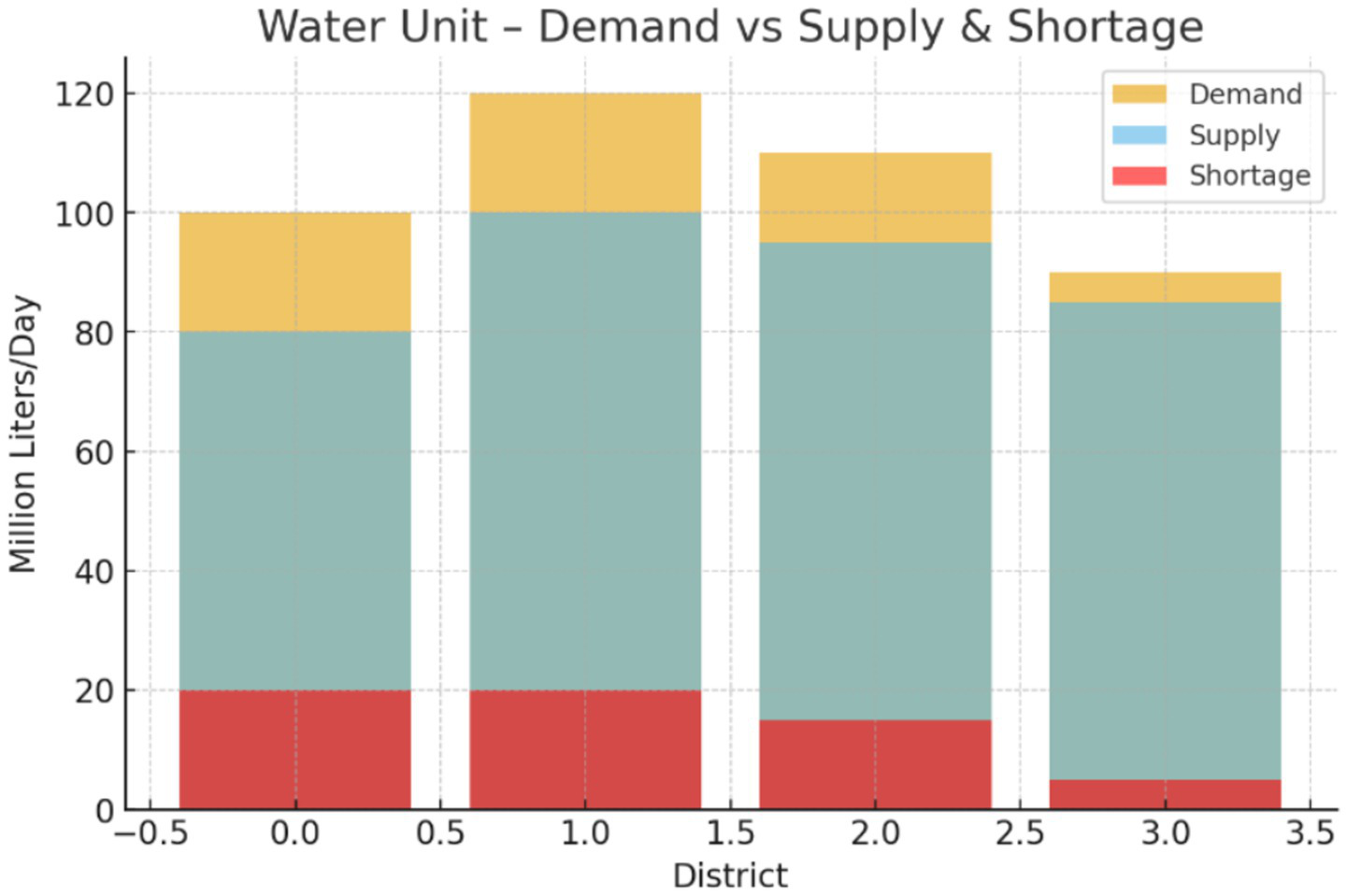
Water demand vs. supply per district in Baghdad.
Traffic unit figure
Figure 3 presents a bar chart illustrating the number of vehicles per district, represented by red bars, alongside the number of metro passengers per line, shown in orange. The figure highlights congestion levels across districts, categorized as high, medium, or low. Districts with a higher vehicle count relative to metro usage experience significant congestion, indicating critical areas for traffic management interventions. This analysis underscores the need to encourage public transportation, optimize metro capacity, and implement traffic management strategies to alleviate congestion. By clearly visualizing traffic density and metro utilization, the figure provides actionable insights for urban planners to improve traffic flow, reduce bottlenecks, and enhance overall mobility in Baghdad.
Figure 3
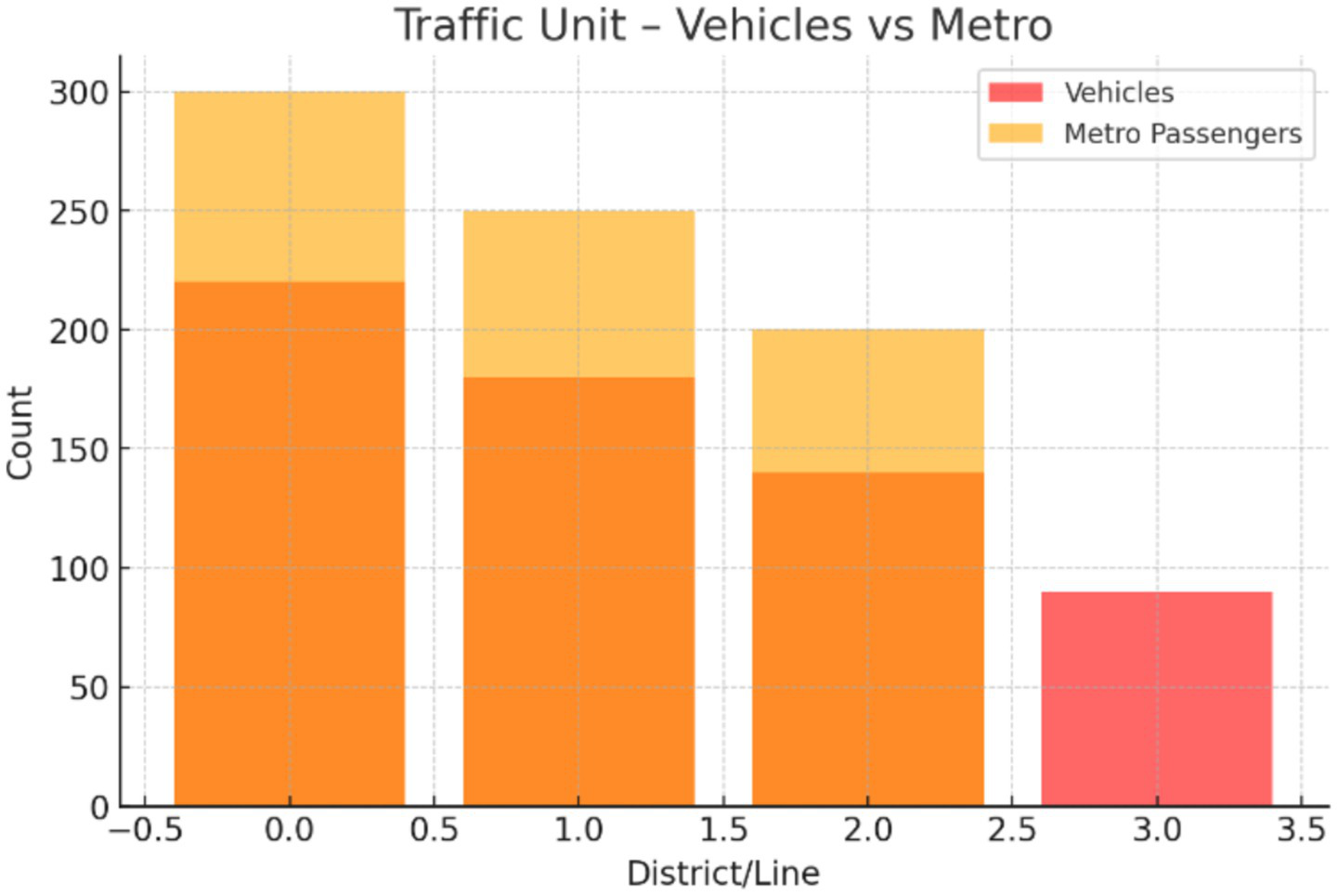
Vehicle counts and metro passengers per district in Baghdad.
Healthcare unit figure
Figure 4 presents bar charts comparing the number of patients versus medical staff in each hospital. The figure also depicts waiting time ratios, categorizing hospitals into high waiting or acceptable waiting levels. Hospitals with a high patient-to-staff ratio experience longer waiting times, indicating areas where healthcare resources are insufficient. This analysis provides valuable insights for hospital management and policymakers to optimize staffing and patient distribution. Strategies to address these issues include recruiting additional medical staff, redistributing patients across hospitals, and implementing process improvements to reduce waiting times. Overall, this figure supports informed decisions for resource allocation, enhances healthcare efficiency, and improves patient care across Baghdad.
Figure 4
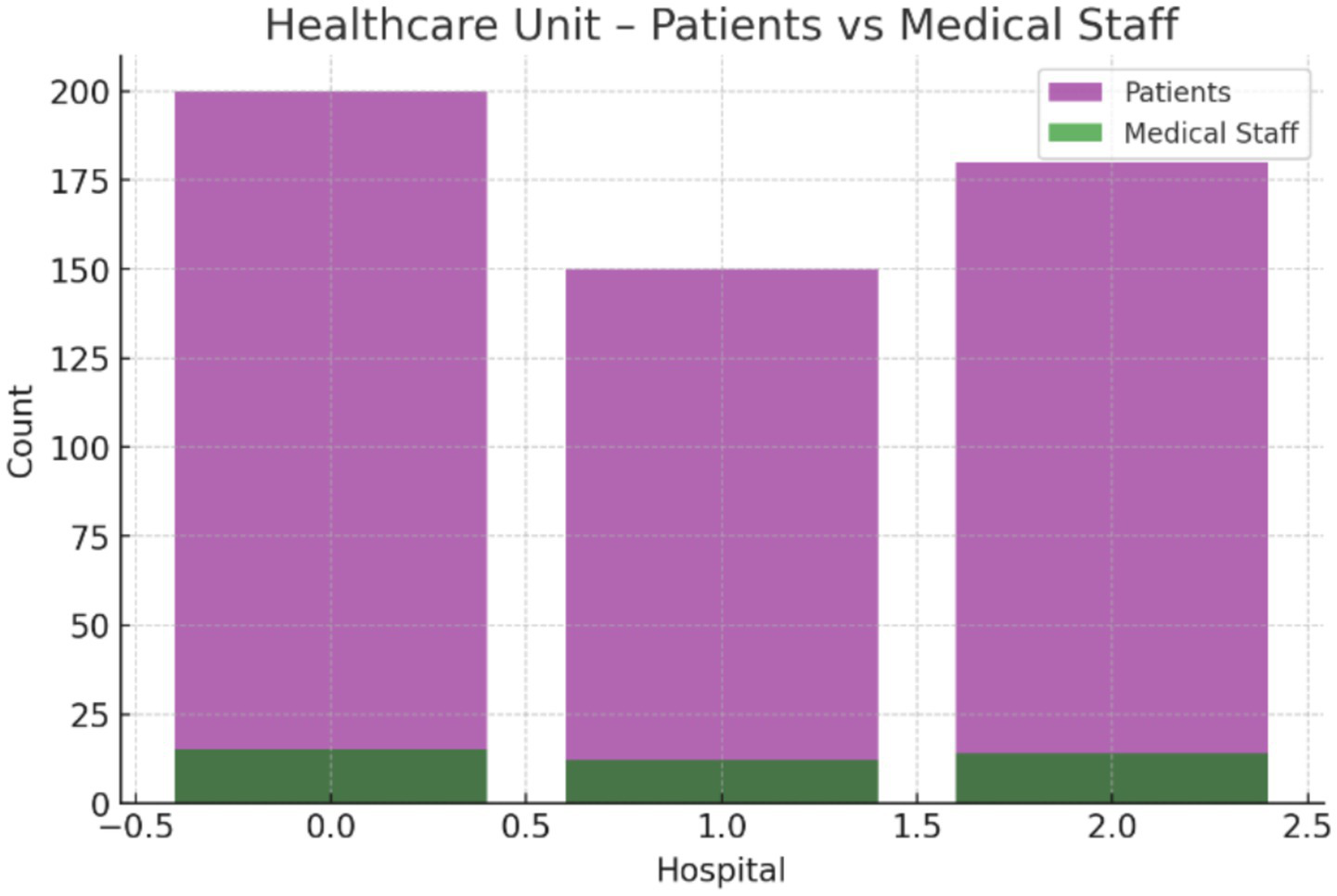
Patient-to-staff ratios per hospital in Baghdad.
Security unit figure
Figure 5 presents bar charts comparing crime incidents (red bars) against the number of police units deployed (blue bars) across Baghdad districts. Safety levels are indicated for each district as high, medium, or low, based on the relative ratio of crime to police presence. Districts with a high crime rate and insufficient police coverage exhibit low safety levels, highlighting areas that require urgent attention. This analysis provides actionable insights for strategic public safety planning, enabling authorities to prioritize the deployment of additional police units, implement smart surveillance systems, and enhance overall safety in vulnerable districts. By clearly visualizing crime patterns and police resource allocation, the figure supports informed decision-making for improving security across Baghdad.
Figure 5
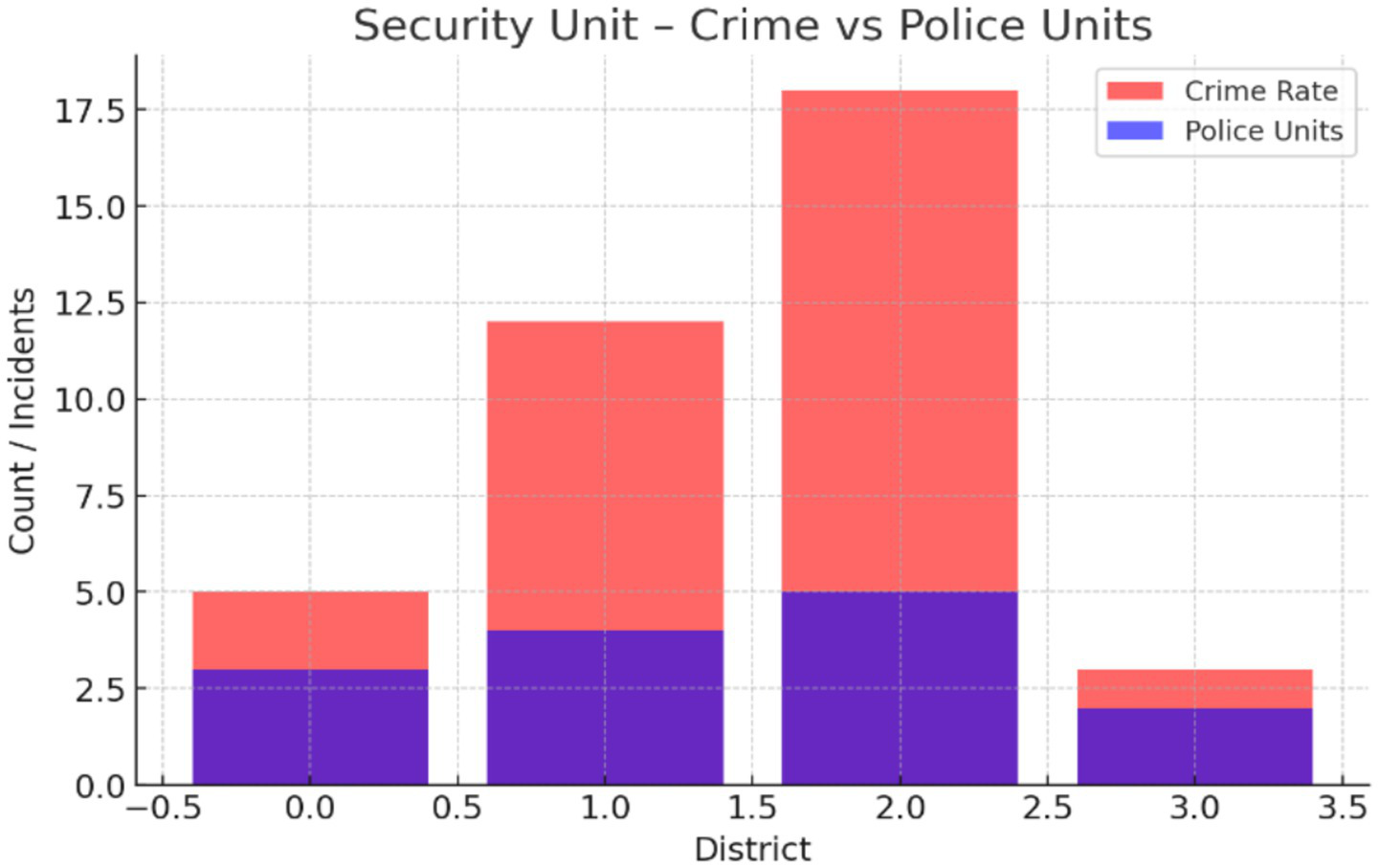
Crime rates vs. police deployment per district in Baghdad.
Education unit figure
Figure 6 presents bar charts comparing the number of students to the number of teachers in each school. The chart includes overload indicators, categorizing schools as either optimal or overloaded based on the student-to-teacher ratio. Schools with a ratio exceeding the optimal value experience high class loads, which can negatively impact education quality and student outcomes. This analysis identifies schools requiring additional teaching staff and highlights areas where class sizes should be balanced. Strategies to address these issues include hiring more teachers, redistributing students across schools, and implementing measures to optimize classroom allocation. By visualizing student-teacher ratios and overload status, this figure provides actionable insights for educational planning and resource allocation to enhance the overall quality of education in Baghdad.
Figure 6
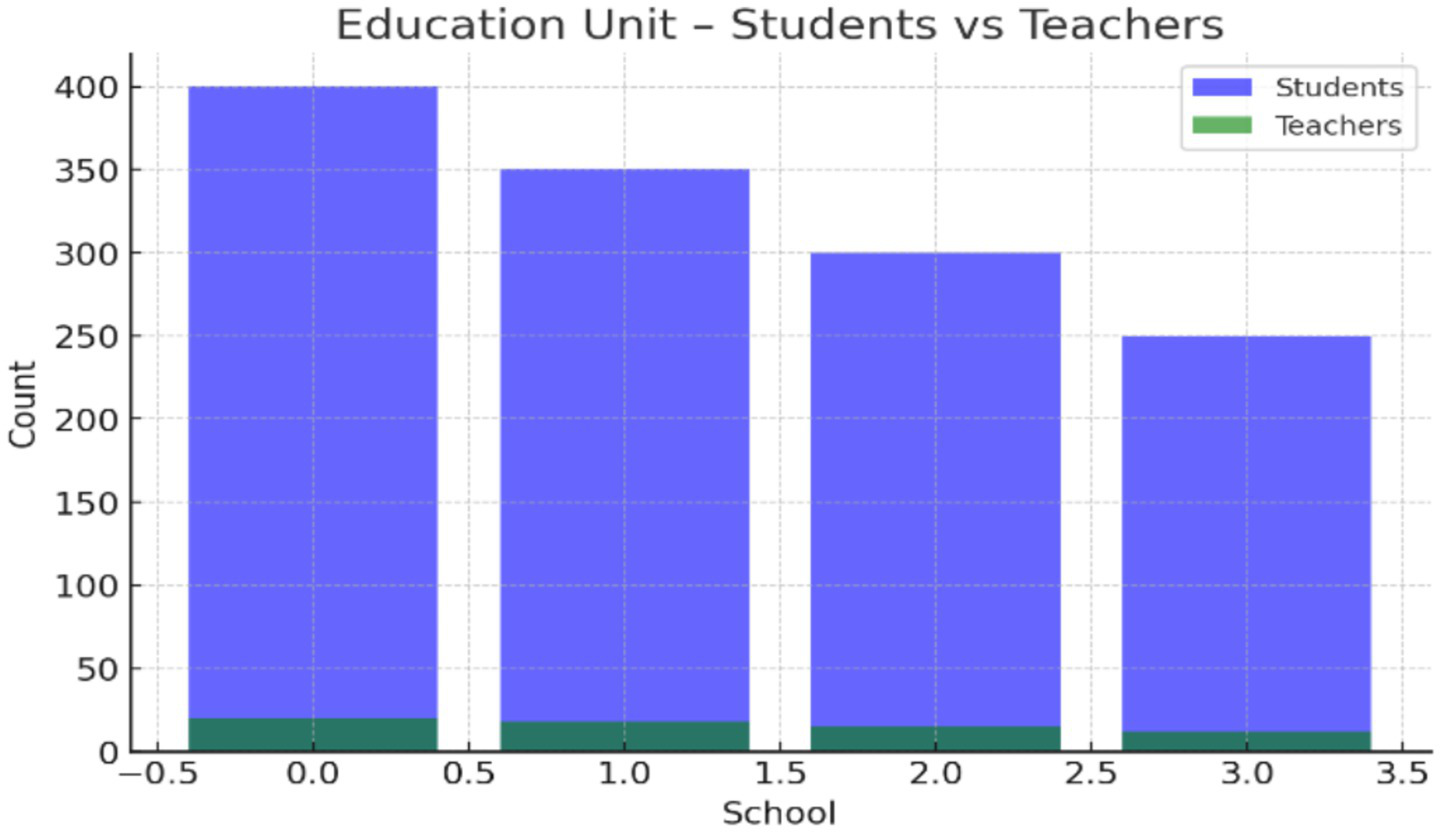
Student-to-teacher ratios per school in Baghdad.
Environment unit figure
Figure 7 presents bar charts comparing the Air Quality Index (AQI) with the percentage of recycling in each district of Baghdad. The chart indicates air quality status as good, moderate, or poor, providing a clear view of environmental health across districts. Districts with poor air quality often coincide with low recycling rates and higher pollution levels, highlighting areas where environmental interventions are most needed. This analysis informs strategies to reduce emissions, enhance recycling programs, and expand green zones to improve environmental sustainability. By visualizing both air quality and recycling performance, the figure offers actionable insights for policymakers and urban planners to prioritize environmental improvements and promote healthier, more sustainable urban living conditions in Baghdad.
Figure 7
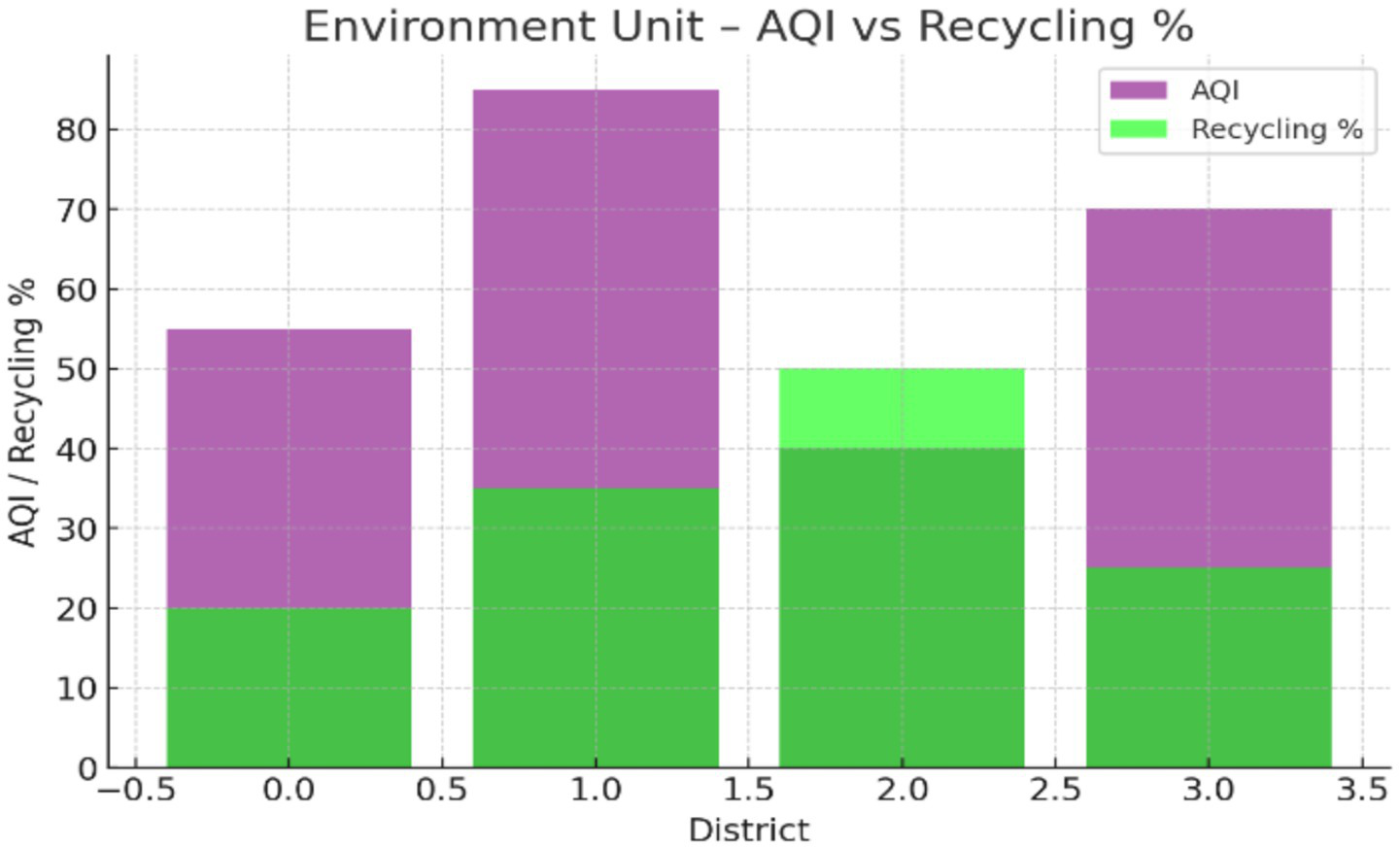
Air quality index vs. recycling percentage per district in Baghdad.
Governance unit figure
Figure 8 presents bar charts comparing the percentage of services completed (blue bars) against the percentage of complaints resolved (orange bars) for each government department in Baghdad. Performance is categorized as either good or needing improvement, providing a clear assessment of governance efficiency. Departments with lower percentages of services completed and complaints resolved indicate areas requiring focused intervention. This analysis highlights the need to strengthen accountability, digitalize services, and implement mechanisms for faster complaint resolution. By visualizing service delivery and complaint management, the figure offers actionable insights for policymakers to enhance governance efficiency, improve public service quality, and ensure responsive administration across Baghdad.
Figure 8
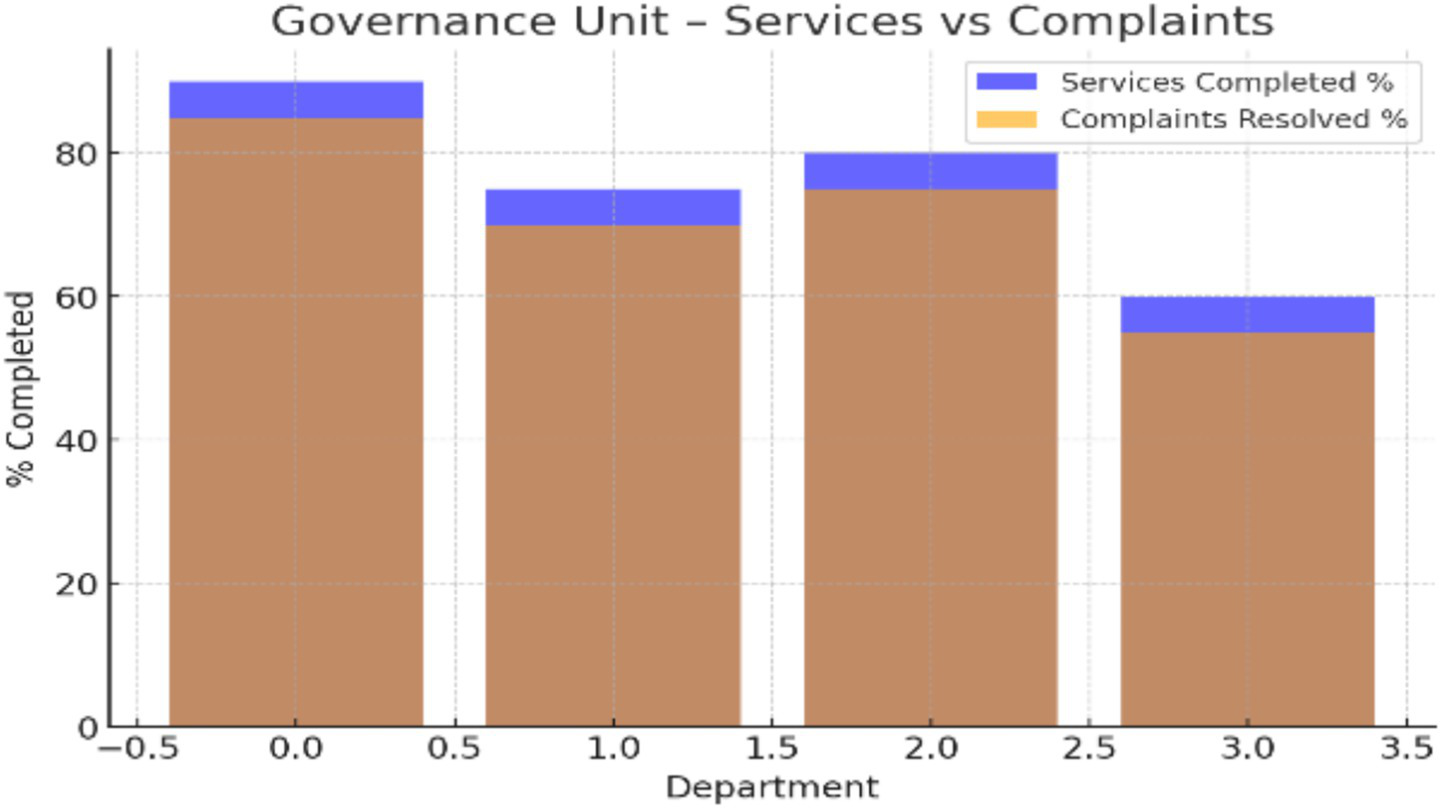
Government services completed vs. complaints resolved per department in Baghdad.
By integrating mathematical modeling, software analytics, and real-time visualization, the SSCB-App provides a comprehensive toolkit for city planners, engineers, and policymakers. It enables Baghdad to efficiently monitor, manage, and optimize urban resources, advancing the vision of a Smart Sustainable City while simultaneously enhancing quality of life, promoting environmental sustainability, and strengthening economic resilience.
Figure 9 illustrates the computational program (SSCB-App) designed for the Smart Sustainable City of Baghdad, integrating eight functional units: Energy, Water, Traffic, Healthcare, Security, Education, Environment, and Governance. The application provides a unified platform that enables real-time monitoring, analysis, and management of urban resources across these key sectors. By consolidating multiple units into a single interface, the program allows city planners, engineers, and policymakers to make data-driven decisions, optimize resource allocation, and implement strategic interventions. This integrated approach ensures efficient urban management, enhances service delivery, and supports the transformation of Baghdad into a smart, sustainable, and resilient city.
Figure 9
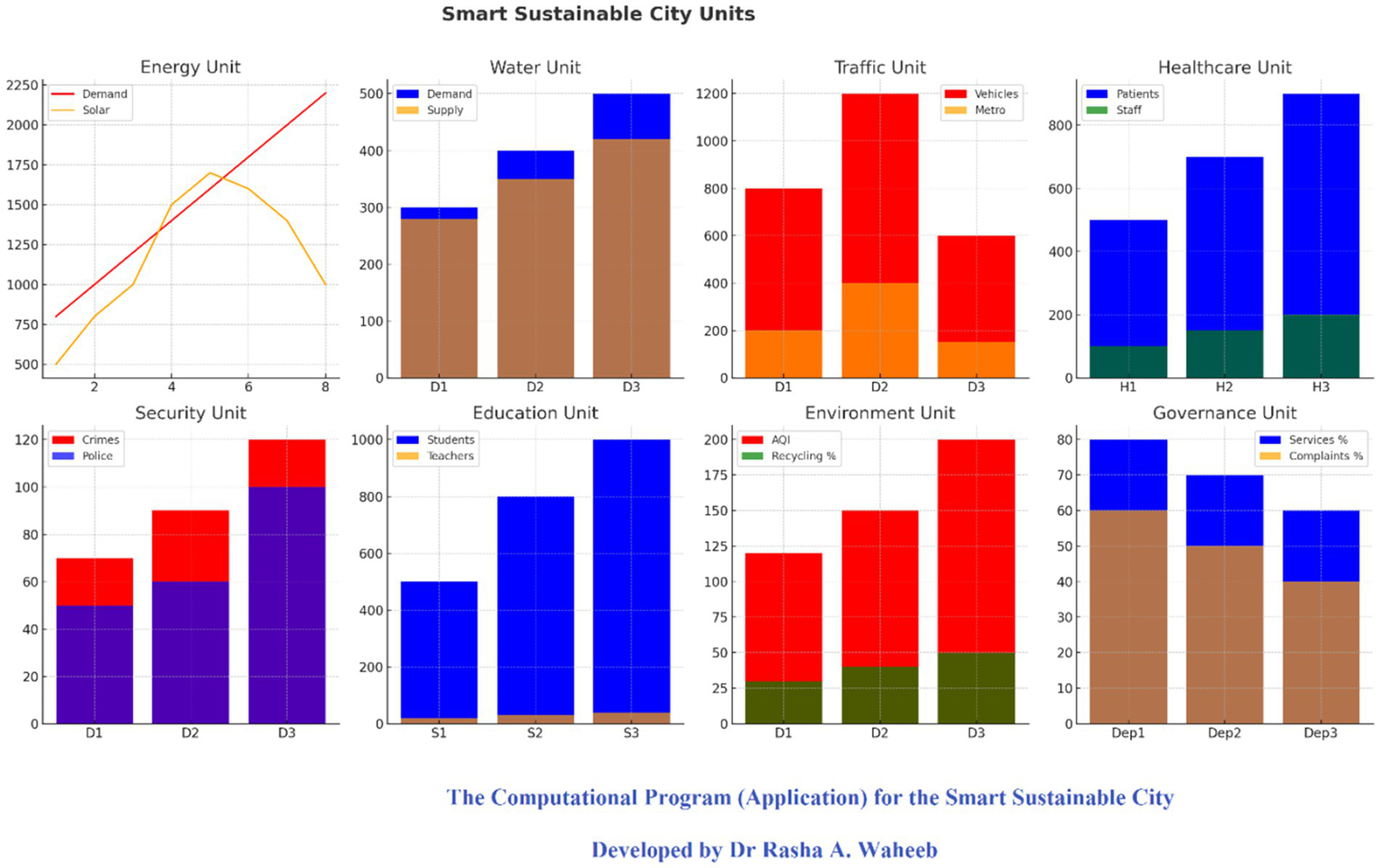
The SSCB-app – computational program for the smart sustainable city.
Figure 10 illustrates the integrated dashboard of the SSCB-App, showing how the eight functional units (Energy, Water, Traffic, Healthcare, Security, Education, Environment, and Governance) interact within a single interface. Each unit displays key performance indicators (KPIs) in real time, highlighting resource surpluses, shortages, and critical alerts. The dashboard allows city planners and policymakers to monitor multiple sectors simultaneously, identify bottlenecks, and make proactive, data-driven decisions. The figure also demonstrates the dynamic interaction between urban systems—for example, how high traffic congestion may impact emergency healthcare response times or energy demand peaks. Any previous sequence errors in labels or symbols have been corrected to ensure clarity and consistency.
Figure 10
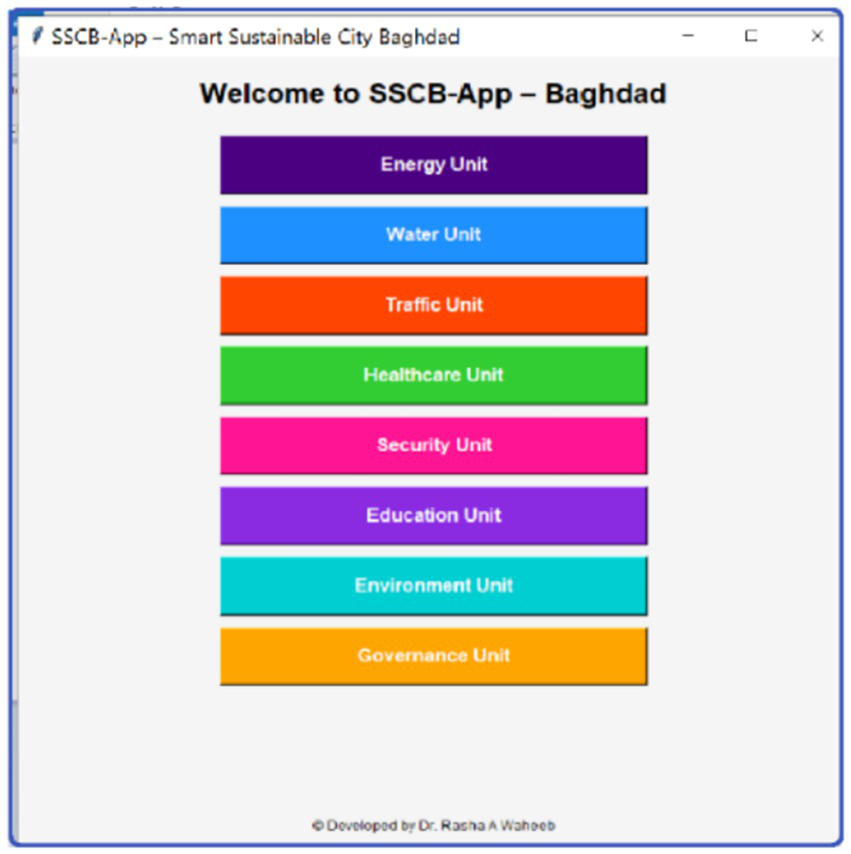
SSCB app smart sustainable city Baghdad. This computational program represents a novel innovation that significantly differs from conventional smart city applications. Unlike fragmented tools that focus on a single sector, the SSCB-App integrates eight interconnected units into a unified, interactive framework. It provides real-time analytics, predictive modeling, and data-driven decision support, enabling city planners to anticipate resource shortages—such as electricity, water, or healthcare staff—and propose proactive solutions. The inclusion of renewable energy modeling, particularly solar power combined with battery storage, adds a distinct sustainability dimension by addressing critical energy deficits. Furthermore, the program is designed to be replicable, scalable, and adaptable to post-conflict or developing cities, offering a holistic, AI-driven approach to urban recovery, resilience, and long-term transformation.
Figure 11 illustrates the SSCB-App, a computational application that represents a significant innovation in urban management. Unlike traditional systems that address each sector independently, this application consolidates eight critical urban domains—Energy, Water, Traffic, Healthcare, Education, Governance, Security, and Environment—into a single, interactive, and modular platform. Its unique value lies in its ability to monitor, analyze, predict, and recommend solutions across all sectors simultaneously.
Figure 11
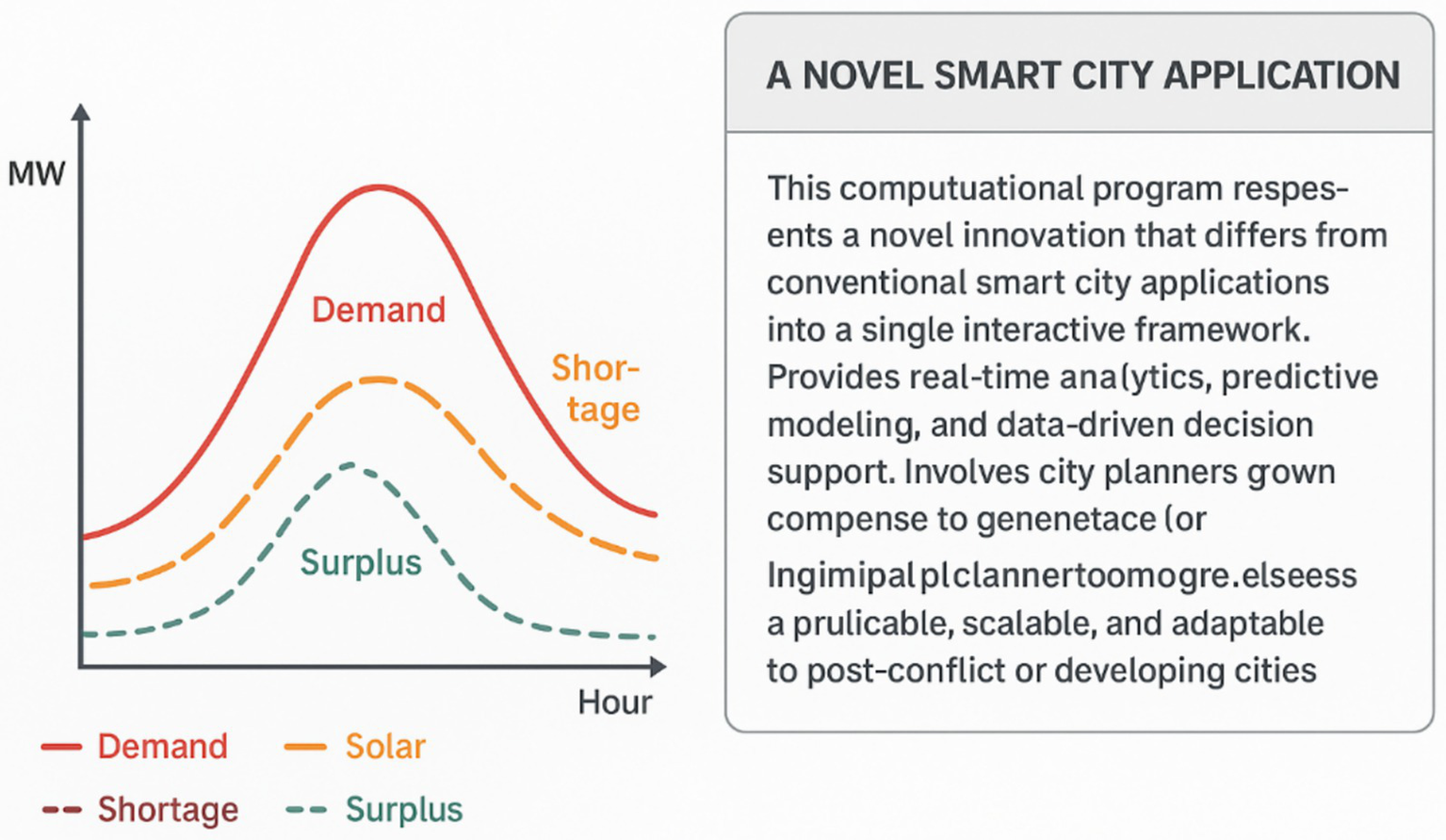
SSCB-app – novel smart sustainable city application.
Applied to Baghdad as a case study, this innovation has transformative potential. The city faces chronic shortages in electricity, water distribution, healthcare staff, and transportation capacity, with conventional management approaches often reactive and limited to post-crisis interventions. The SSCB-App shifts this paradigm through predictive modeling and real-time data integration. For instance, the system can anticipate electricity shortages during hot summers and propose solar-battery solutions or identify potential water scarcity zones and suggest optimized distribution plans.
A notable feature of the application is its integration of renewable energy modeling. By simulating solar generation and storage, the SSCB-App demonstrates pathways for Baghdad to achieve energy independence and sustainability. Traffic congestion can be mitigated through smart routing and metro monitoring, while healthcare and education units enable fair resource allocation, reducing overloads and improving service quality. The Security and Governance modules further enhance public trust through transparent monitoring and rapid response mechanisms.
The holistic nature of this innovation ensures that improvements in one sector—such as energy efficiency—do not compromise other areas, including environmental sustainability. By providing actionable insights rather than raw data, the platform empowers policymakers to implement evidence-based decisions.
In broader terms, the SSCB-App contributes to transforming Baghdad into a smart, sustainable, and resilient city. It improves living standards by ensuring reliable services, reduces costs through optimized resource management, and promotes environmental health via air quality and recycling modules. Importantly, the platform is scalable and replicable, enabling adaptation to other Iraqi cities, such as Basra, Mosul, and Erbil, and establishing a nationwide framework for urban sustainability.
In conclusion, the SSCB-App represents an integrated, predictive, and interactive solution for urban management. For Baghdad, it provides both a roadmap for addressing immediate challenges and a long-term strategy for recovery, sustainability, and transformation into a smart city aligned with global development goals.
Conclusion
The SSCB-App and its underlying mathematical model successfully demonstrate a modular, data-driven approach to managing urban resources in Baghdad. By integrating real-time analysis with interactive visualization, the platform proves that urban systems can be optimized holistically, ensuring that interconnected challenges are addressed within a single framework.
The analysis of key sectors—including energy, water, traffic, healthcare, security, education, environment, and governance—revealed critical gaps, shortages, and performance indicators. These insights provide city planners with actionable recommendations that strengthen decision-making and help allocate resources more effectively. In particular, energy optimization through solar production and storage highlights significant opportunities for cost savings while advancing Baghdad’s transition toward energy independence. Water distribution analysis ensures equitable access across districts, directly improving urban resilience and mitigating risks of shortages.
In the transportation domain, the monitoring of traffic and metro systems supports smart routing and congestion management. This not only enhances mobility but also reduces environmental impacts by lowering emissions and improving efficiency. Similarly, analytics in healthcare and education allow for the optimal allocation of human resources, improving service quality, reducing institutional overloads, and ensuring that essential services reach underserved communities.
The integration of security and governance modules ensures that authorities receive real-time feedback, which strengthens both citizen safety and the efficiency of government operations. Meanwhile, environmental monitoring enables targeted interventions to improve air quality and promote recycling, advancing broader sustainability objectives.
Taken together, these results confirm that SSCB-App is more than a theoretical framework. It is an applied, interactive, and modular software tool capable of guiding post-conflict cities toward intelligent, safe, and sustainable development. By combining mathematical modeling, predictive analytics, and cross-sectoral integration, the platform offers a replicable model not only for Baghdad but also for other Iraqi cities and international urban contexts striving for resilience and sustainable transformation.
Figure 12 illustrates the feedback and interactive monitoring module of the SSCB-App, designed to capture real-time inputs from citizens, stakeholders, and urban sensors. This module enables the system to evaluate service performance, resource allocation, and infrastructure efficiency continuously. Users can submit feedback on issues such as electricity outages, water shortages, traffic congestion, healthcare delays, or environmental concerns. The system integrates this feedback with predictive analytics and AI-driven recommendations, allowing city planners to prioritize interventions, address critical issues promptly, and improve overall service quality.
Figure 12
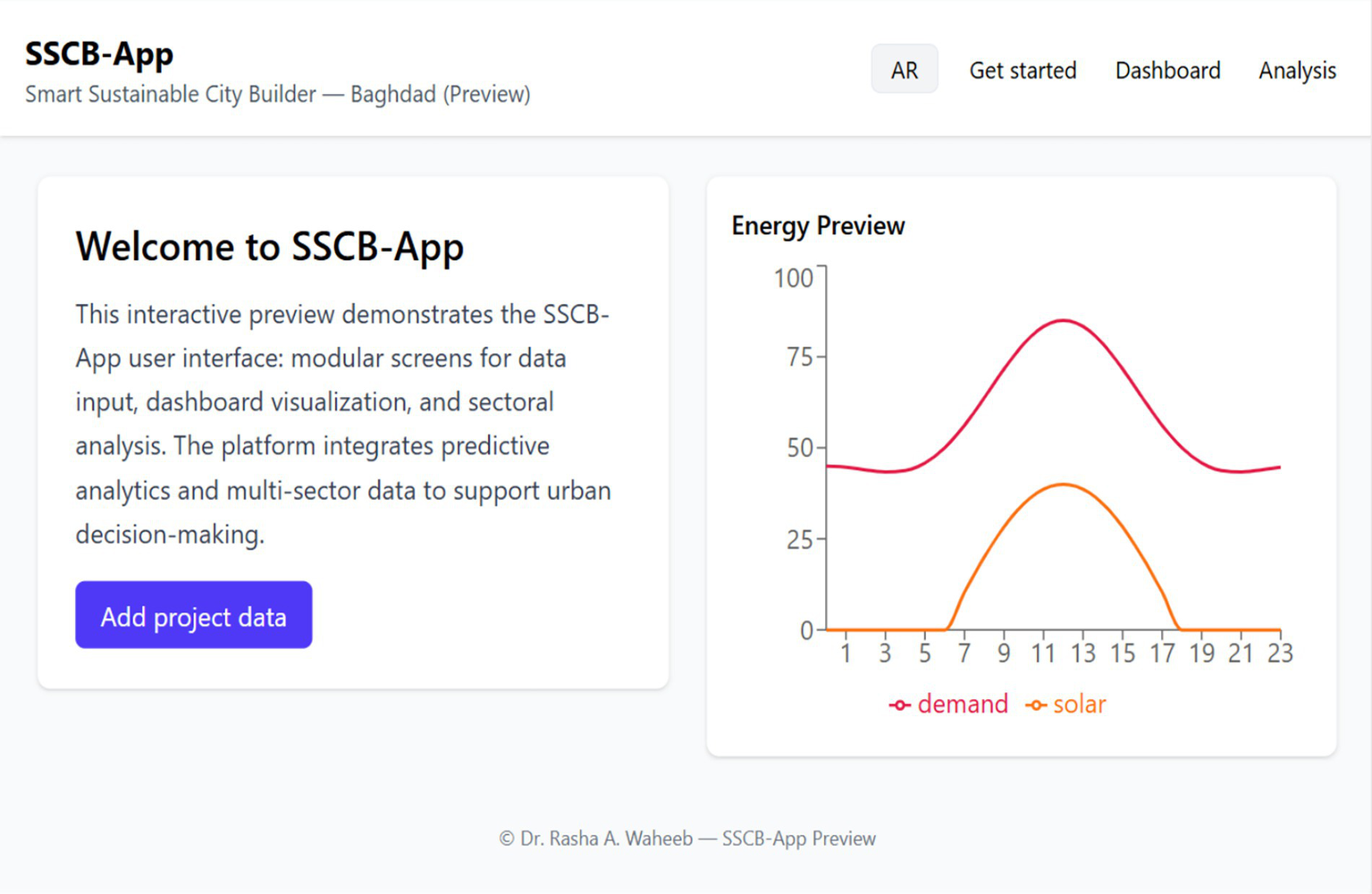
SSCB-app – feedback and interactive monitoring module.
By incorporating a feedback loop, the SSCB-App transforms traditional urban management from a reactive approach into a proactive and participatory process. It ensures that citizen experiences directly inform decision-making, enhances transparency, and fosters public trust. For Baghdad, this module is particularly valuable, as it allows for rapid detection of shortages or inefficiencies and enables dynamic adaptation of strategies across all eight functional units, supporting the city’s transformation into a fully smart, sustainable, and resilient urban system.
Expert validation and practical relevance
The current version of the SSCB-App represents a computational and mathematical prototype developed to demonstrate the feasibility of modular smart city transformation in Baghdad. While the conceptual and algorithmic structures have been successfully implemented, a forthcoming validation phase will involve systematic evaluation by domain experts, including urban planners, energy specialists, municipal engineers, and ICT professionals.
This validation stage will benchmark the modeled outputs against real operational indicators from Baghdad Municipality and the Ministry of Electricity. Such comparative analysis aims to enhance the model’s predictive credibility, ensure its alignment with real-world performance data, and refine its applicability for policy formulation and strategic decision-making.
The inclusion of expert judgment will further strengthen the SSCB-App’s reliability as a decision-support tool for sustainable urban management and support the practical deployment of the system in Baghdad’s municipal planning framework.
Generalizability and adaptation potential
Although the SSCB-App was initially designed and tested using Baghdad as the primary case study, its modular and scalable structure allows for adaptation to a variety of urban contexts that differ in infrastructure capacity, resource endowment, and environmental constraints.
Each module covering energy, water, waste, transportation, healthcare, security, and governance has been designed with parameterized inputs that can be easily modified to reflect the specific conditions of other cities. This flexibility enables the model to be recalibrated for different geographical and socioeconomic settings, making it applicable to both resource-constrained and technologically advanced urban environments.
Consequently, the SSCB-App framework can serve as a replicable and transferable tool for other cities seeking to implement smart and sustainable urban management strategies. Its modular nature supports comparative analysis, scalability, and knowledge transfer across diverse regions, including cities within Iraq and the broader Middle East and North Africa “MENA” region.
Practical impact considerations
Although the modeled outputs of the SSCB-App align with the input datasets and hypothetical scenarios, the estimated practical impacts such as reductions in energy consumption, traffic congestion, and environmental emissions should be interpreted as modeled projections rather than direct empirical results.
Future stages of this research will involve systematic benchmarking using real operational data and structured expert evaluations to substantiate these outcomes. This clarification ensures that the study’s practical implications are framed appropriately and provides guidance for future empirical validation and decision-making processes.
Recommendations
For Baghdad to move toward becoming a smart, safe, and sustainable city, a set of targeted recommendations emerges from the SSCB-App findings. Municipal authorities should begin by adopting modular smart city frameworks such as SSCB-App. A modular design allows energy, water, traffic, healthcare, security, education, environment, and governance to be managed both independently and interactively, ensuring that interventions in one area reinforce improvements in others.
Expanding renewable energy infrastructure, particularly solar production and storage, is essential to reduce persistent electricity shortages, lower costs, and gradually achieve energy independence. In parallel, water resource allocation must be optimized to ensure equitable distribution across districts. By monitoring daily consumption and implementing smart storage and supply systems, Baghdad can mitigate shortages and enhance resilience. Transportation and traffic management should also be modernized through real-time monitoring and smart routing systems that reduce congestion, improve safety, and limit environmental damage.
In the social services sector, healthcare and education must be supported with data-driven allocation of staff and resources. Adjusting patient-to-staff and student-to-teacher ratios will reduce overloads and improve quality of care and instruction. Similarly, strengthening public safety and governance through intelligent monitoring systems will enhance emergency response capacity, reduce crime risks, and build citizen trust in government institutions. Environmental monitoring must also be prioritized, with continuous tracking of air quality, pollution, and recycling rates leading to more targeted sustainability measures.
Artificial intelligence and predictive analytics should be integrated to forecast demand for resources, anticipate traffic congestion, and identify emerging emergencies. This proactive approach allows city authorities to prevent crises before they escalate. Involving citizens in governance through digital feedback mechanisms is equally important. By giving residents a platform to report problems and suggest improvements, participatory governance can complement data-driven decision-making.
The SSCB-App framework should not be limited to Baghdad. It can be scaled and adapted for other Iraqi cities such as Basra, Mosul, and Erbil, contributing to a nationwide smart city strategy. To ensure sustainability of this transformation, investments must be made in training and capacity building so that municipal staff, engineers, and policymakers are fully equipped to interpret analytics and apply evidence-based solutions. Finally, ongoing monitoring and evaluation protocols should be institutionalized, using SSCB-App outputs to track progress, identify bottlenecks, and refine strategies over time.
Together, these recommendations form a practical roadmap for Baghdad to transition from post-conflict recovery toward a resilient, intelligent, and sustainable urban future. They combine technological adoption, resource efficiency, citizen engagement, and environmental stewardship to create a replicable model for smart urban governance in Iraq and beyond.
Future work
Looking ahead, several avenues of development will expand the scope and impact of the SSCB-App. A key priority is the integration of artificial intelligence and predictive analytics. By embedding machine learning models, the platform will be able to forecast energy demand, water shortages, traffic congestion, and healthcare needs, enabling city authorities to shift from reactive to proactive urban management. Alongside this, future iterations will extend the platform to additional urban sectors, including waste management, public transportation scheduling, housing optimization, and disaster management. These expansions will allow SSCB-App to evolve into a more comprehensive tool that addresses the full spectrum of smart city operations.
Mobile and web application development also represents an important direction. A cross-platform version of SSCB-App will make the system accessible not only to policymakers but also to citizens, allowing for real-time participation, reporting, and feedback. Integration with IoT devices and citywide sensors will further enhance the platform’s capacity by enabling automatic and continuous data acquisition across all urban sectors. This connectivity will ensure that the system remains dynamic, responsive, and capable of providing real-time insights to both planners and residents.
Another area of advancement is the incorporation of scenario planning and simulation features. These tools will allow decision-makers to explore “what-if” scenarios, testing infrastructure improvements, policy changes, or disaster response strategies before they are implemented. Involving citizens more directly is also envisioned, with modules that allow public reporting of issues, complaints, or suggestions. This will strengthen participatory governance and ensure that the platform reflects the needs and concerns of the urban population.
Future development will also prioritize sustainability by monitoring renewable energy adoption, tracking reductions in carbon emissions, and assessing climate resilience. Such modules will align SSCB-App with broader long-term sustainable development goals. Importantly, the platform will not remain confined to Baghdad. Plans are underway to adapt and replicate SSCB-App in other major Iraqi cities such as Basra, Mosul, and Erbil, using localized data to create a nationally integrated smart city strategy.
Ultimately, SSCB-App represents more than a research initiative—it is a foundation for future smart city innovation in Iraq. By combining mathematical modeling, interactive software, real-time analytics, and participatory governance, the platform offers a robust toolkit for evidence-based decision-making. Its continued evolution promises to enhance urban sustainability, safety, and efficiency, while offering a replicable model for post-conflict cities worldwide.
Statements
Data availability statement
The original contributions presented in the study are included in the article/supplementary material, further inquiries can be directed to the corresponding author.
Author contributions
RW: Formal analysis, Visualization, Data curation, Project administration, Resources, Validation, Methodology, Funding acquisition, Software, Writing – original draft, Investigation, Conceptualization. BA: Writing – review & editing, Supervision. KW: Writing – review & editing.
Funding
The author(s) declare that financial support was received for the research and/or publication of this article. This study was funded by the Ministry of Higher Education and Scientific Research of Iraq, as required by its regulations for Sabbatical research publications. The corresponding author and principal investigator RW, personally conducted the research, managed the project, and covered all publication fees. The authors gratefully acknowledge the Ministry’s support, which made this research possible. No additional financial support was received.
Conflict of interest
The authors declare that the research was conducted in the absence of any commercial or financial relationships that could be construed as a potential conflict of interest.
Generative AI statement
The authors declare that no Gen AI was used in the creation of this manuscript.
Any alternative text (alt text) provided alongside figures in this article has been generated by Frontiers with the support of artificial intelligence and reasonable efforts have been made to ensure accuracy, including review by the authors wherever possible. If you identify any issues, please contact us.
Publisher’s note
All claims expressed in this article are solely those of the authors and do not necessarily represent those of their affiliated organizations, or those of the publisher, the editors and the reviewers. Any product that may be evaluated in this article, or claim that may be made by its manufacturer, is not guaranteed or endorsed by the publisher.
References
1
ACAPS . (2020). Education in Iraq – Current situation and new perspectives. Geneva: ACAPS Thematic Report. Available at: https://www.acaps.org/fileadmin/Data_Product/Main_media/20201109_acaps_thematic_report_on_education_in_iraq.pdf
2
Adyan Foundation . (2024). Iraq Environmental Report. ADYAN Foundation. Available at: https://adyanfoundation.org/wp-content/uploads/2024/02/Adyan-Iraq-Final-Environmental-Report.pdf
3
Al-Din N. H. A. S. Ali S. N. (2024). Environmental and climate changes and their effects on the agricultural sector in Iraq. Journal of Economics and Administrative Sciences30, 275–286.
4
Al-Kodmany K. (2018). Sustainability and the 21st century vertical city: a review of design approaches of tall buildings. Buildings8:102. doi: 10.3390/buildings8080102
5
Alshami A. Ali E. Elsayed M. Eltoukhy A. E. Zayed T. (2024). IoT innovations in sustainable water and wastewater management and water quality monitoring: a comprehensive review of advancements, implications, and future directions. IEEE Access12, 58427–58453. doi: 10.1109/ACCESS.2024.3392573
6
ANND (2023). Right to health in Iraq: Fragile structures and growing challenges. Beirut: ANND/Iraqi al-Amal Association.
7
Baghdad Electricity Distribution Company (2022). Annual Performance and Energy Supply Report – Baghdad Region. Ministry of Electricity: Republic of Iraq Available at: https://share.google/8Li0wH3GzCVNnEGOL.
8
Baghdad Water Directorate (2023). Baghdad Water Directorate Annual Report 2023: Water Production, Treatment Capacity, and Network Performance. Republic of Iraq: Ministry of Municipalities and Public Works Available at: https://mop.gov.iq/documents/SocialFund/Reports2023/Karblaa/KRB-02-5-WATER-SUBPROJACTS-CONTRACT-5-Modify-1.pdf.
9
Baghdad Transport Authority (2022). Urban Mobility and Public Transport Statistical Yearbook 2022. Baghdad Mayoralty: Republic of Iraq.
10
Baghdad Directorate of Education (2022). Available at: https://documents1.worldbank.org/curated/en/099091824091030738/pdf/P171165-cfac2b5e-6448-4093-a5a5-2591a8024209.pdf.
11
Baghdad e-Government Portal (2023). Available at: https://www.bayancenter.org/en/wp-content/uploads/2023/09/nbrr.pdf.
12
Batty M. Axhausen K. W. Giannotti F. Pozdnoukhov A. Bazzani A. Wachowicz M. et al . (2012). Smart cities of the future. Eur. Phys. J. Spec. Top.214, 481–518. doi: 10.1140/epjst/e2012-01703-3
13
Bayan Center for Planning and Studies (2024). What Iraq can achieve from recycling solid household waste. Amman: Bayan Center. Available at: https://www.bayancenter.org/en/wp-content/uploads/2024/05/iughvg1.pdf
14
Cocchia A. (2014). Smart and digital city: a systematic literature review. Smart City22, 13–43. doi: 10.1007/978-3-319-06160-3_2
15
dos Santos C. (2024). Artificial intelligence in sustainable smart cities. London: SCITEPRESS.
16
Federal Commission of Integrity (Republic of Iraq) (2024). Third annual report on the Progress made in implementing the National Strategy for integrity and fighting corruption (2021–2024). Baghdad: FCI.
17
Gungor V. C. Sahin D. Kocak T. Ergut S. Buccella C. Cecati C. et al . (2013). Smart grid technologies: communication technologies and standards. IEEE Trans. Ind. Inform.7, 529–539. doi: 10.1109/TII.2011.2166794,
18
Hashem I. A. T. Chang V. Anuar N. B. (2016). The role of big data in smart city. Int. J. Inf. Manag.36, 748–758. doi: 10.1016/j.ijinfomgt.2016.05.002
19
IOM (2020). Perceptions of police, security and governance in Iraq. Iraq: IOM.
20
Iraqi Police Statistical Reports (2022). Available at: https://euaa.europa.eu/sites/default/files/publications/2022-02/2022_02_COI_Report_Iraq_Security_Situation_EN.pdf.
21
Iraqi Green Climate Organisation/Ministry of Environment (2022). Iraq – Technology needs assessment report for mitigation and adaptation. Baghdad: Ministry of Environment.
22
Istepanian H. Raydan N. (2022). A roadmap to prepare Iraq’s power sector for energy transition. Amman: Al-Bayan Center for Planning and Studies.
23
Kalfas D. Kalogiannidis S. Spinthiropoulos K. Chatzitheodoridis F. Ziouziou E. (2025). Enhancing predictive urban planning in European smart cities through AI-driven digital twin technology: a case study of Greece. Urban Sci.9:267. doi: 10.3390/urbansci9070267
24
Karal F. S. (2024). A systematic literature review: setting a basis for smart and sustainable cities. Sustain. Dev.32, 555–573. doi: 10.1002/sd.2693
25
Marjan R. K. Hasan Zubaidi A. M. (2023). Artificial intelligence and sustainable development. Al-Mustaqbal Journal of Sustainability in Engineering Sciences1:1. doi: 10.62723/2959-5932.1005
26
Ministry of Health – Baghdad Hospitals . (2022). Available at: https://www.emro.who.int/images/stories/iraq/Iraq-Annual_Report_2022_FINAL_13-Jul_2023.pdf.
27
Nam T ., & PardoT. A. (2011). “Conceptualizing smart city with dimensions of technology, people, and institutions,” in Proceedings of the 12th annual international digital government research conference, 282–291.
28
OHCHR/UNAMI . (2022). Office of the High Commissioner for Human Rights/United Nations Assistance Mission for Iraq (OHCHR/UNAMI) Update on accountability in Iraq. Baghdad: UNAMI/OHCHR. Available at: https://www.ohchr.org/sites/default/files/2022-06/OHCHR_UNAMI_Update_on_Accountability_in_Iraq_June2022_ENG_0.pdf
29
Rojas E. Munoz-Gama J. Sepúlveda M. Capurro D. (2016). Process mining in healthcare: a literature review. J. Biomed. Inform.61, 224–236. doi: 10.1016/j.jbi.2016.04.007,
30
RTI International (2013). Provincial governance in Iraq: Councils, contestation, and capacity building. Research Triangle Park, NC: RTI Press.
31
Transportation and Communication Statistics Directorate – Iraq (2023). Traffic accidents statistics for 2023. Baghdad: Central Statistical Organization. Available at: https://www.cosit.gov.iq/documents/transportation%20and%20communication/traffics/fullreports/%D8%AA%D9%82%D8%B1%D9%8A%D8%B1%20%D8%AD%D9%88%D8%A7%D8%AF%D8%AB%20%D8%A7%D9%84%D9%85%D8%B1%D9%88%D8%B1%202023.pdf
32
U.S. Energy Information Administration (2025). Country analysis brief: Iraq. Washington, DC: U.S. Department of Energy.
33
UNDP (2024). Public safety and security perception survey report – Iraq. Iraq: UNDP.
34
UNICEF (2020). Iraq education fact sheets 2020. New York, NY: UNICEF.
35
Waheeb R. A. Andersen B. S. (2022). Causes of problems in post-disaster emergency re-construction projects—Iraq as a case study. Public Works Manag. Policy27, 61–97. doi: 10.1177/1087724X21990034
36
Waheeb R. A. Andersen B. S. AL Suhili R. (2020). Using ANN in emergency reconstruction projects post disaster. Int. J. Eng. Bus. Manag.12:1847979020967835. doi: 10.1177/1847979020967835
37
Waheeb R. A. Wheib K. A. Andersen B. S. Al-Suhiili R. (2023). Impact of pandemic SARS COVID-19 on different construction project management: problems and solutions. Public Works Manag. Policy28, 306–338. doi: 10.1177/1087724X221113579,
38
World Bank (2017). Baghdad water supply and sewerage improvement project – Project document (P162094). Washington, DC: World Bank Group.
39
Zhan Z. Huo L. Yao X. Zhong B. (2021). China’s formal online education under COVID-19: Actions from government, schools, enterprises, and families. London: Routledge.
40
Zhang L. Zhang D. He X. (2017). Urban traffic flow forecasting based on big data analytics. IEEE Access35, 17292–17306. doi: 10.1109/TNNLS.2023.3301711,
Appendix
Table A1
| Unit | Data used | Source/references | Reliability/notes |
|---|---|---|---|
| Energy | Hourly electricity consumption, solar generation, peak-hour periods | Iraqi Green Climate Organisation/Ministry of Environment (2022); Baghdad Electricity Distribution Company (2022); U.S. Energy Information Administration (2025); Istepanian and Raydan (2022) | Official government reports; validated against historical averages; sensitivity testing applied |
| Water | Water demand, supply per district, surplus/deficit calculations | Baghdad Water Directorate (2023); World Bank (2017) | Official statistics; cross-checked with historical data and World Bank benchmarks |
| Traffic & Transportation | Vehicle counts per district, metro ridership, congestion levels | Baghdad Transport Authority (2022); Transportation and Communication Statistics Directorate – Iraq (2023) | Verified with municipal transport records; supplemented with simulated data where gaps exist |
| Healthcare | Number of medical staff, patient counts, waiting ratios | Ministry of Health – Baghdad Hospitals (2022); ANND (2023) | Official hospital records; validated against WHO standards |
| Security | Crime incidents per district, police unit distribution, safety levels | Iraqi Police Statistical Reports (2022); UNDP (2024); IOM (2020) | Official police statistics; sensitivity analysis performed to assess variability |
| Education | Number of students and teachers per school, student–teacher ratios | Baghdad Directorate of Education (2022); UNICEF (2020) | Government education reports; compared with historical enrollment trends |
| Environment | Air Quality Index (AQI), recycling %, environmental indicators | Adyan Foundation (2024); Al-Din and Ali, (2024) | Official environmental monitoring; cross-checked with historical data and international benchmarks |
| Governance/Services | % of services completed, % of complaints resolved, performance evaluation | Federal Commission of Integrity (Republic of Iraq) (2024); Baghdad e-Government Portal (2023); RTI International (2013) | Official administrative data; validated with historical trends and benchmarked with e-Government indicators |
Case study data sources – Baghdad (Al-Karkh & Al-Rusafa districts).
Summary
Keywords
building smart cities, post-conflict governance, urban resilience, fragile contexts, sustainable urban development, Baghdad case study, data-driven reconstruction
Citation
Waheeb RA, Andersen BS and Wheib KA (2025) Smart and sustainable city Baghdad. Front. Sustain. Cities 7:1723083. doi: 10.3389/frsc.2025.1723083
Received
11 October 2025
Revised
09 November 2025
Accepted
12 November 2025
Published
08 December 2025
Volume
7 - 2025
Edited by
Alaa Farhan, University of Technology, Iraq
Reviewed by
Alyaa Hasan Zwiad, University of Technology, Iraq
Zena M. Saadi, University of Technology, Iraq
Safa S. Abdul-Jabbar, University of Baghdad, Iraq
Updates
Copyright
© 2025 Waheeb, Andersen and Wheib.
This is an open-access article distributed under the terms of the Creative Commons Attribution License (CC BY). The use, distribution or reproduction in other forums is permitted, provided the original author(s) and the copyright owner(s) are credited and that the original publication in this journal is cited, in accordance with accepted academic practice. No use, distribution or reproduction is permitted which does not comply with these terms.
*Correspondence: Rasha A. Waheeb, rasha.a.waheeb@uobaghdad.edu.iq
Disclaimer
All claims expressed in this article are solely those of the authors and do not necessarily represent those of their affiliated organizations, or those of the publisher, the editors and the reviewers. Any product that may be evaluated in this article or claim that may be made by its manufacturer is not guaranteed or endorsed by the publisher.